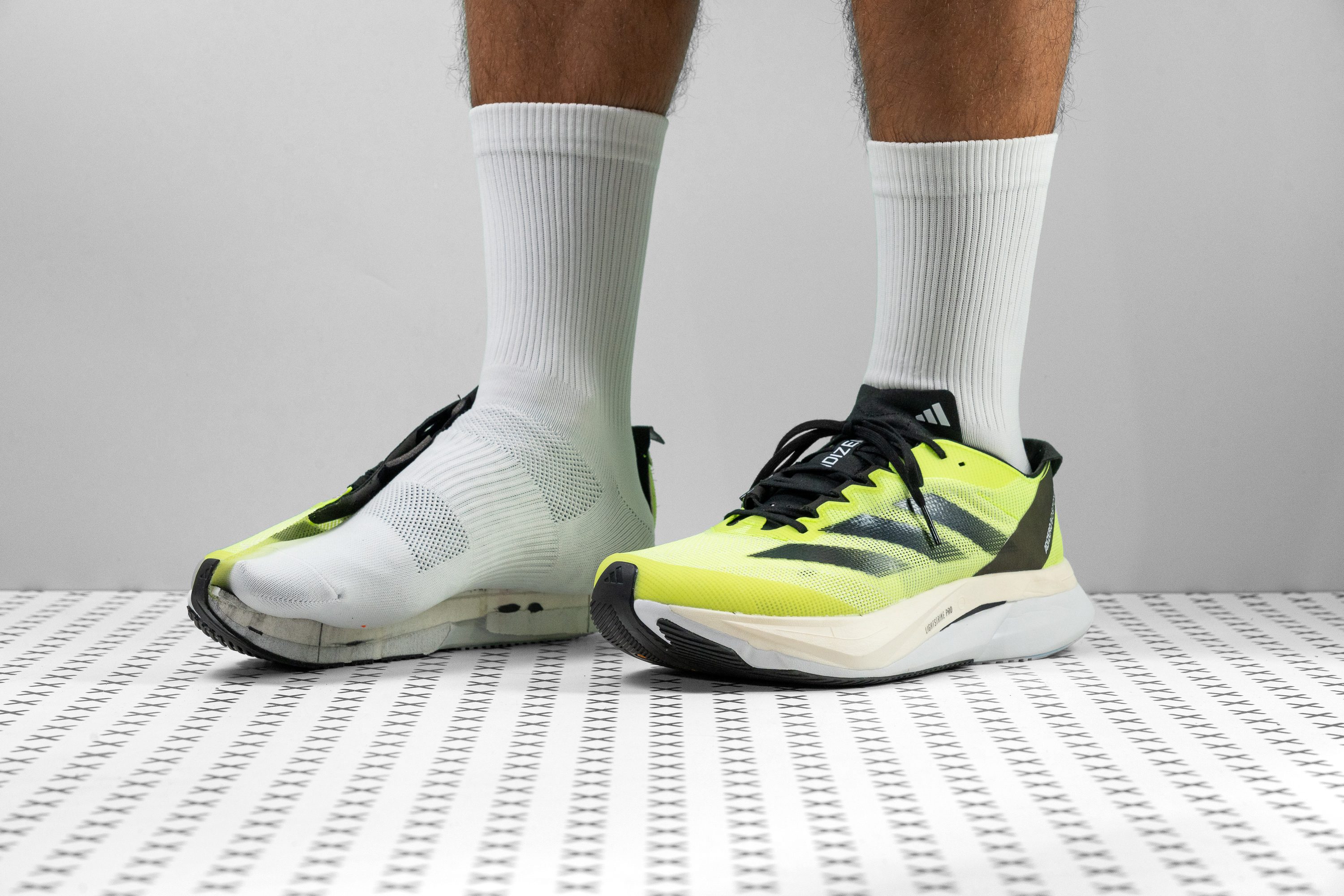Our verdict
- Top pick in best running shoes with a wide toebox (2023)
Pros
- Delivers a fun ride
- Lighter than versions 10 and 11
- Handles both slow and fast paces with ease
- Wide toebox
- Durable and grippy Continental outsole
- Even more Lightstrike Pro superfoam
- Improved stability due to a broader base
- Fantastic for midfoot-to-forefoot strikers
- Fantastic for midfoot-to-forefoot strikers
Cons
- Upper durability falls short
- Tongue and heel could benefit from extra padding
- Heel strikers might prefer v11
Audience verdict
Comparison
The most similar running shoes compared
+ + Add a shoe | |||||
|---|---|---|---|---|---|
| Audience score | 88 Great! | 91 Superb! | 90 Superb! | 84 Good! | |
| Price | £140 | £140 | £110 | £135 | |
| Pace | Tempo | CompetitionTempo | Daily runningTempo | Daily runningTempo | |
| Shock absorption | Moderate | Moderate | High | Moderate | |
| Energy return | Moderate | Moderate | Moderate | Low | |
| Traction | High | High | High | High | |
| Arch support | Neutral | Neutral | Neutral | Neutral | |
| Weight lab Weight brand | 9.2 oz / 261g 9.2 oz / 260g | 9 oz / 254g 9 oz / 255g | 8.6 oz / 245g 8.4 oz / 238g | 7.7 oz / 217g 7.6 oz / 215g | |
| Lightweight | ✗ | ✗ | ✓ | ✓ | |
| Drop lab Drop brand | 6.1 mm 6.5 mm | 6.0 mm 6.0 mm | 8.2 mm 9.0 mm | 5.9 mm 5.0 mm | |
| Strike pattern | Mid/forefoot | Mid/forefoot | HeelMid/forefoot | Mid/forefoot | |
| Size | Slightly large | True to size | Half size small | Half size small | |
| Midsole softness | Balanced | Balanced | Balanced | Soft | |
| Difference in midsole softness in cold | Normal | Normal | Small | Small | |
| Toebox durability | Bad | Decent | Bad | Bad | |
| Heel padding durability | Decent | Good | Good | Good | |
| Outsole durability | Good | Good | Decent | Decent | |
| Breathability | Breathable | Moderate | Breathable | Breathable | |
| Width / fit | Wide | Medium | Wide | Wide | |
| Toebox width | Medium | Narrow | Medium | Wide | |
| Stiffness | Stiff | Moderate | Moderate | Moderate | |
| Torsional rigidity | Stiff | Stiff | Moderate | Stiff | |
| Heel counter stiffness | Flexible | Stiff | Flexible | Moderate | |
| Plate | ✗ | Carbon plate | ✗ | ✗ | |
| Rocker | ✓ | ✓ | ✗ | ✗ | |
| Heel lab Heel brand | 34.5 mm 37.0 mm | 34.3 mm 36.0 mm | 34.9 mm 35.0 mm | 32.8 mm 34.5 mm | |
| Forefoot lab Forefoot brand | 28.4 mm 30.5 mm | 28.3 mm 30.0 mm | 26.7 mm 26.0 mm | 26.9 mm 29.5 mm | |
| Widths available | NormalWide | NormalWide | NormalWide | Normal | |
| Orthotic friendly | ✓ | ✓ | ✓ | ✓ | |
| Season | SummerAll seasons | All seasons | SummerAll seasons | SummerAll seasons | |
| Removable insole | ✓ | ✓ | ✓ | ✓ | |
| Ranking | #233 Top 35% | #27 Top 8% | #47 Top 13% | #252 Bottom 34% | |
| Popularity | #320 Top 47% | #193 Bottom 49% | #180 Top 47% | #134 Top 35% |
Who should buy
The upgraded Adidas Adizero Boston 12 is a truly impressive shoe, and here's who we think will love it the most:
- Midfoot-to-forefoot strikers looking for a training partner with outstanding grip.
- Those who are fans of the Boston series but felt let down by the heavier weight of versions 10 and 11.
- Any runner in need of a versatile shoe that can handle all sorts of training runs, regardless of how fast or long they might be.
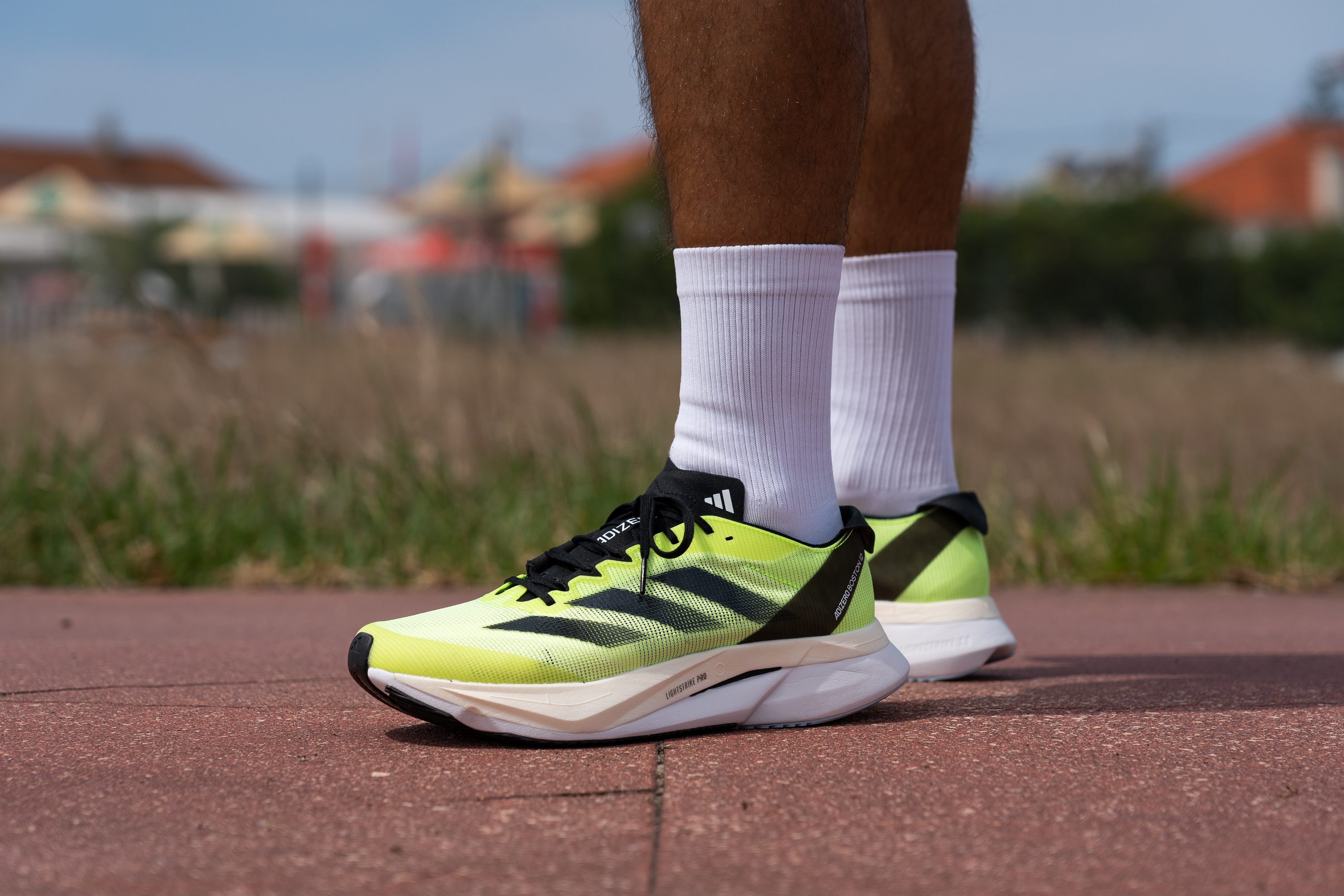
Who should NOT buy
If you're in the market for a soft, flexible running experience, we believe the Boston 12 might not be your shoe. While it's softer than its predecessor, it still delivers a somewhat firm and stiff feel underfoot. In that case, the ASICS Novablast 3 or the Hoka Mach 5 could be better all-rounders.
We also think there are better options if you plan to use the shoe for pure racing or track workouts. It's a bit too heavy for those purposes, and if budget isn't a concern, the Adizero Adios Pro 2 is likely a superior pick. On the other hand, if you're looking for a budget-friendly shoe for fast runs or short races, consider the Adizero Adios 7.
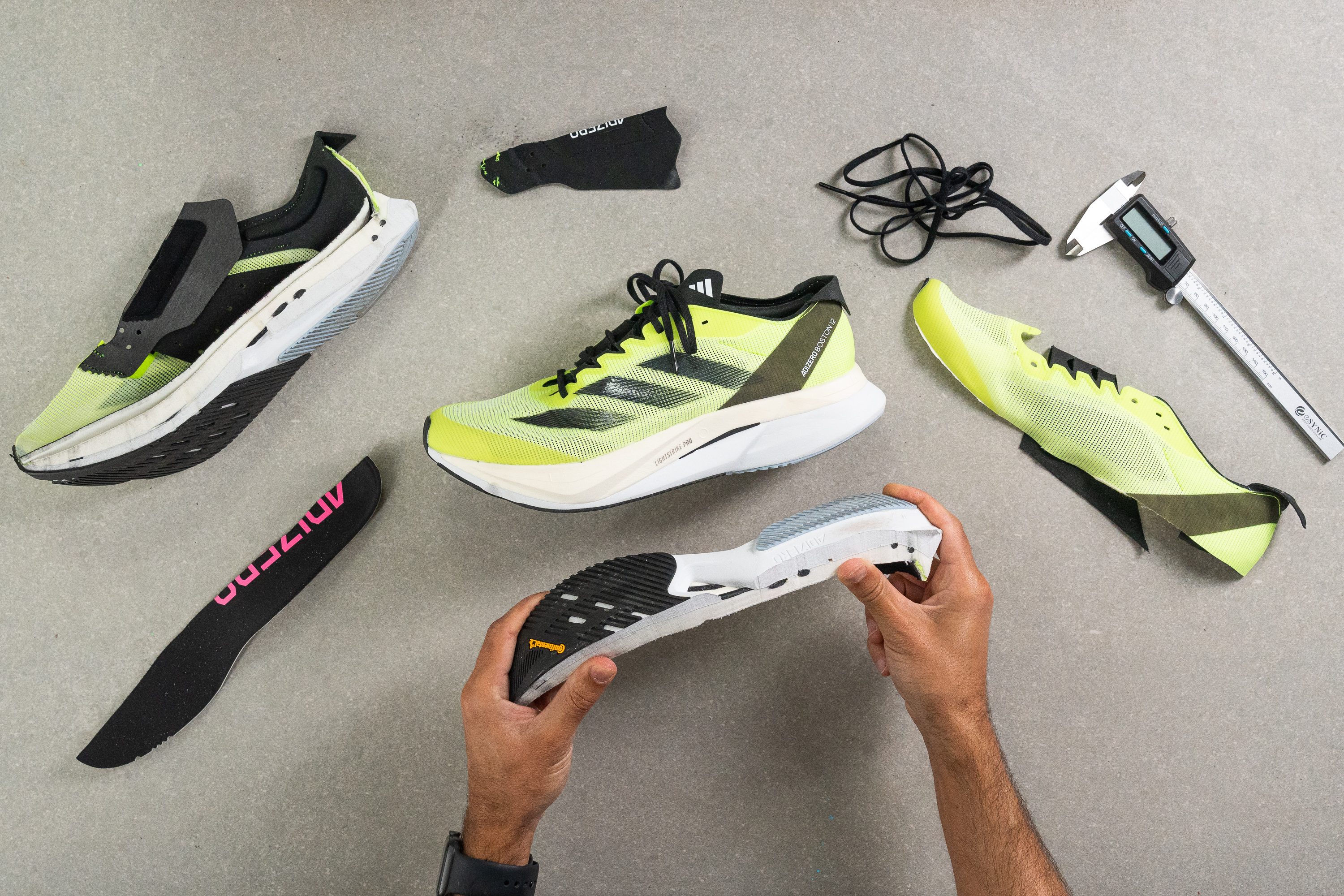
Cushioning
Shock absorption
The 128 SA score we measured for the Boston 12 perfectly aligns with its role as a tempo trainer—offering enough cushioning to handle mid-range efforts and even long runs, while still feeling light and nimble. That said, we believe it’s a more suitable choice for lightweight runners when it comes to +2 hour runs.
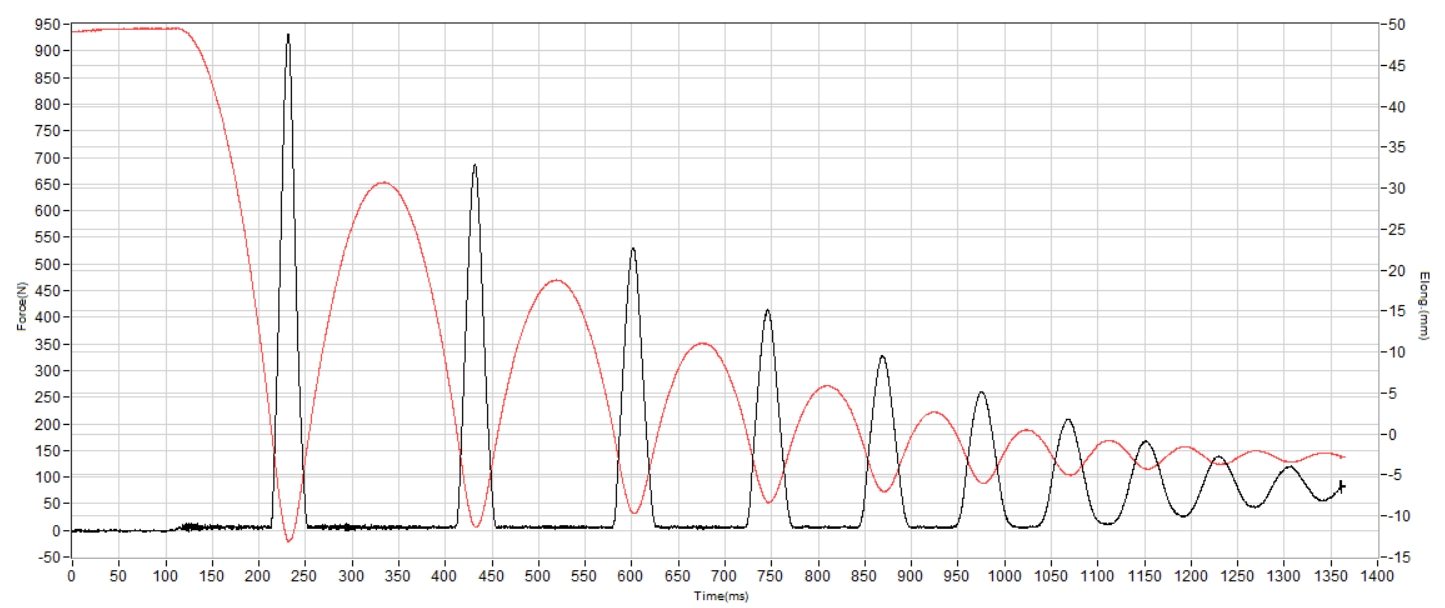
| Adizero Boston 12 | 128 SA |
| Average | 130 SA |
Energy return
The combination of top-tier Lightstrike Pro and the less efficient Lightstrike 2.0 results in a 63.5% energy return in the heel. That's not particularly impressive, but totally expected. Lightstrike Pro typically hits around 75%, while standard Lightstrike 2.0 usually falls below 60%.
Up front, energy return improves by ~4 points thanks to the increased presence of Lightstrike Pro, reinforcing this model as a stronger choice for runners who don’t land on their heels.
| Adizero Boston 12 | 63.5% |
| Average | 58.6% |
Heel stack
The moment we received the shoe in the lab, we found the Boston 12 noticeably sleeker than its predecessor. However, nothing beats the precision of a calliper for an accurate measurement.
The heel, at 34.5 mm, offers 4.6 mm less Lightstrike EVA foam.
This adjustment by the German brand won our approval, echoing the sentiments of many runners who felt the version 11 was bulky and had excess foam in the heel for what should be a speed-focused running shoe.
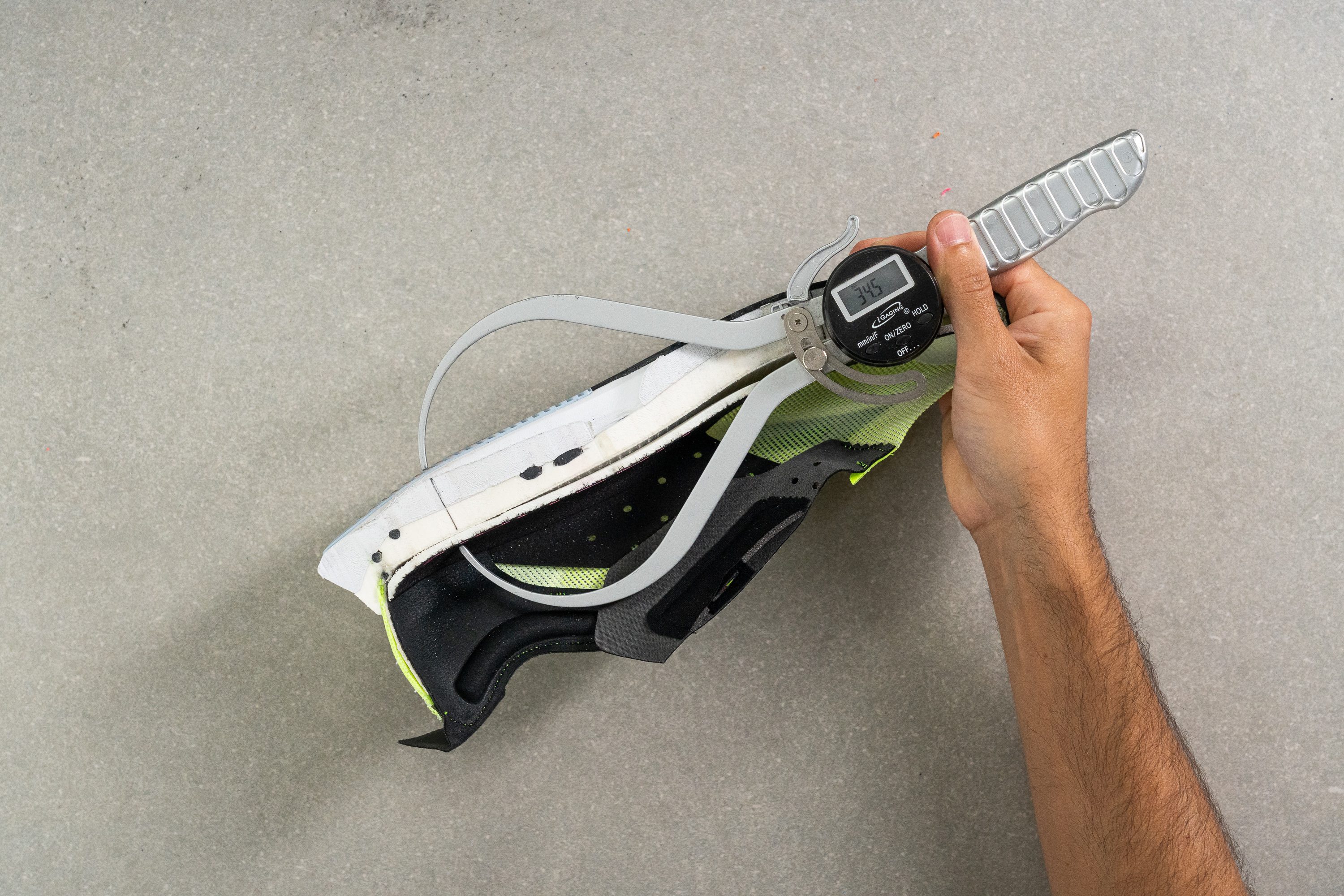
| Adizero Boston 12 | 34.5 mm |
| Average | 34.8 mm |
Forefoot stack
On the other hand, the forefoot thickness remains almost unchanged, clocking in at 28.4 mm. This measurement is 0.9 mm less than the previous model's, making it nearly identical.
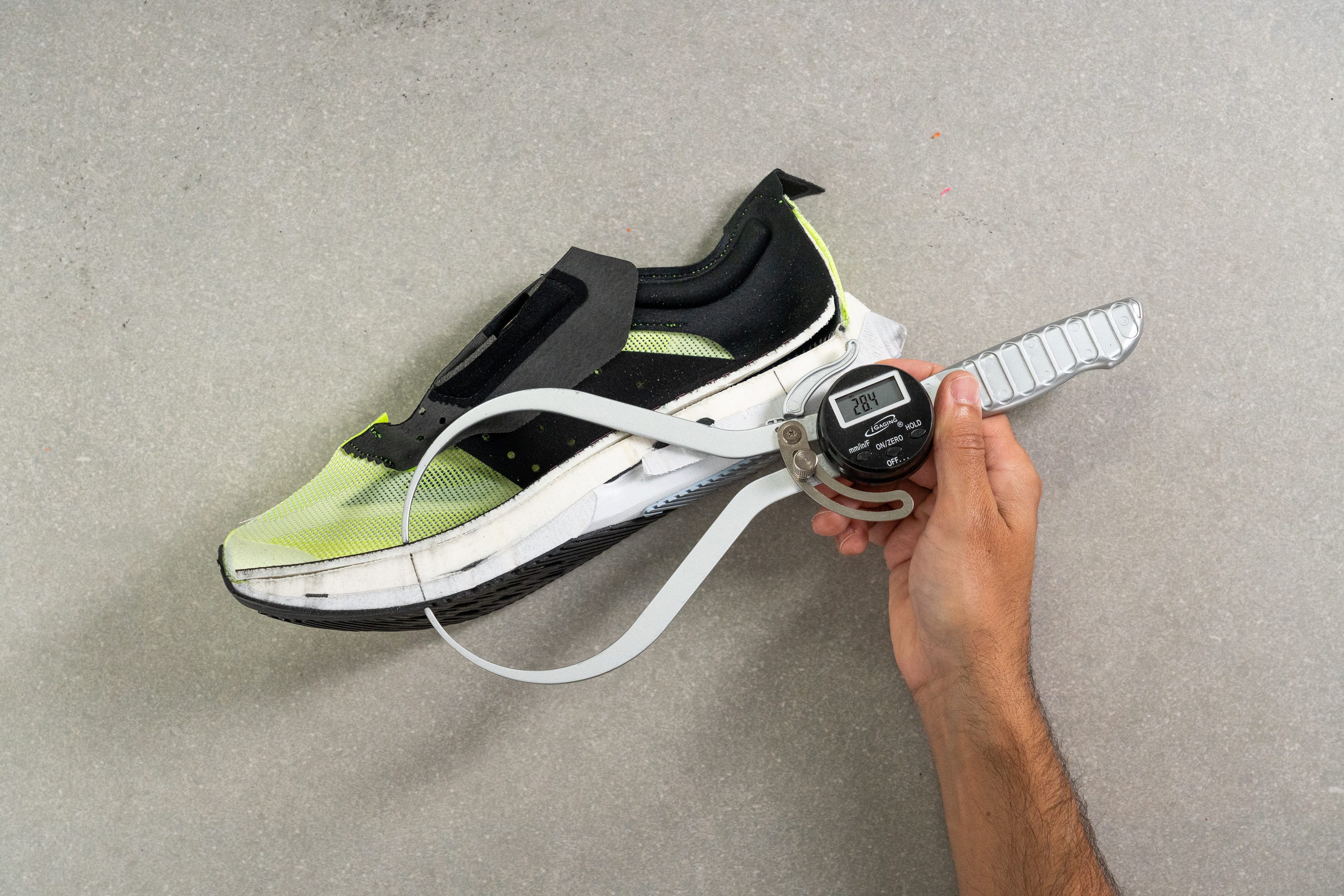
| Adizero Boston 12 | 28.4 mm |
| Average | 26.2 mm |
Drop
The 6.1-mm heel-to-toe drop between the heel and forefoot benefits midfoot and forefoot strikers. And the shoe comes packed with even more of the premium Lightstrike Pro foam in the forefoot area than ever before.
However, those with an extreme heel-strike pattern might find the previous model more suited for that foot strike.
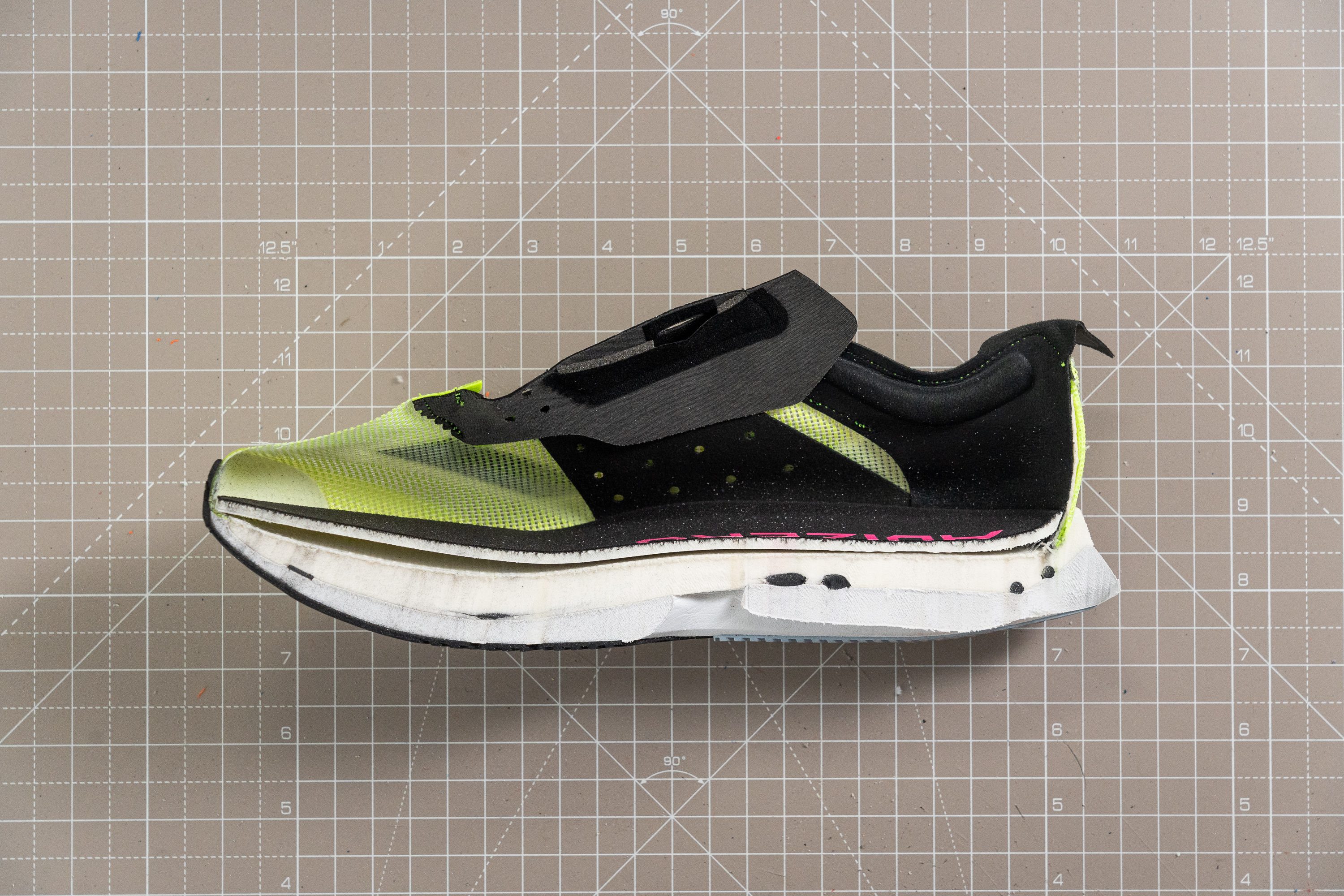
| Adizero Boston 12 | 6.1 mm |
| Average | 8.6 mm |
Midsole softness
UpdatedAdidas has, for a while, been incorporating the less impressive Lightstrike EVA foam in many of its training shoes. We all found it a bit of a disappointment. However, things are finally changing.
Now, enter the new Lightstrike 2.0. Yes, it's still an EVA-based foam, but it's a whole lot lighter and feels far more bouncier underfoot.
While it's crucial to note that it's not the softest foam on the market—we clocked it at 38.3 AC—it's certainly a marked improvement over the first-generation Lightstrike.
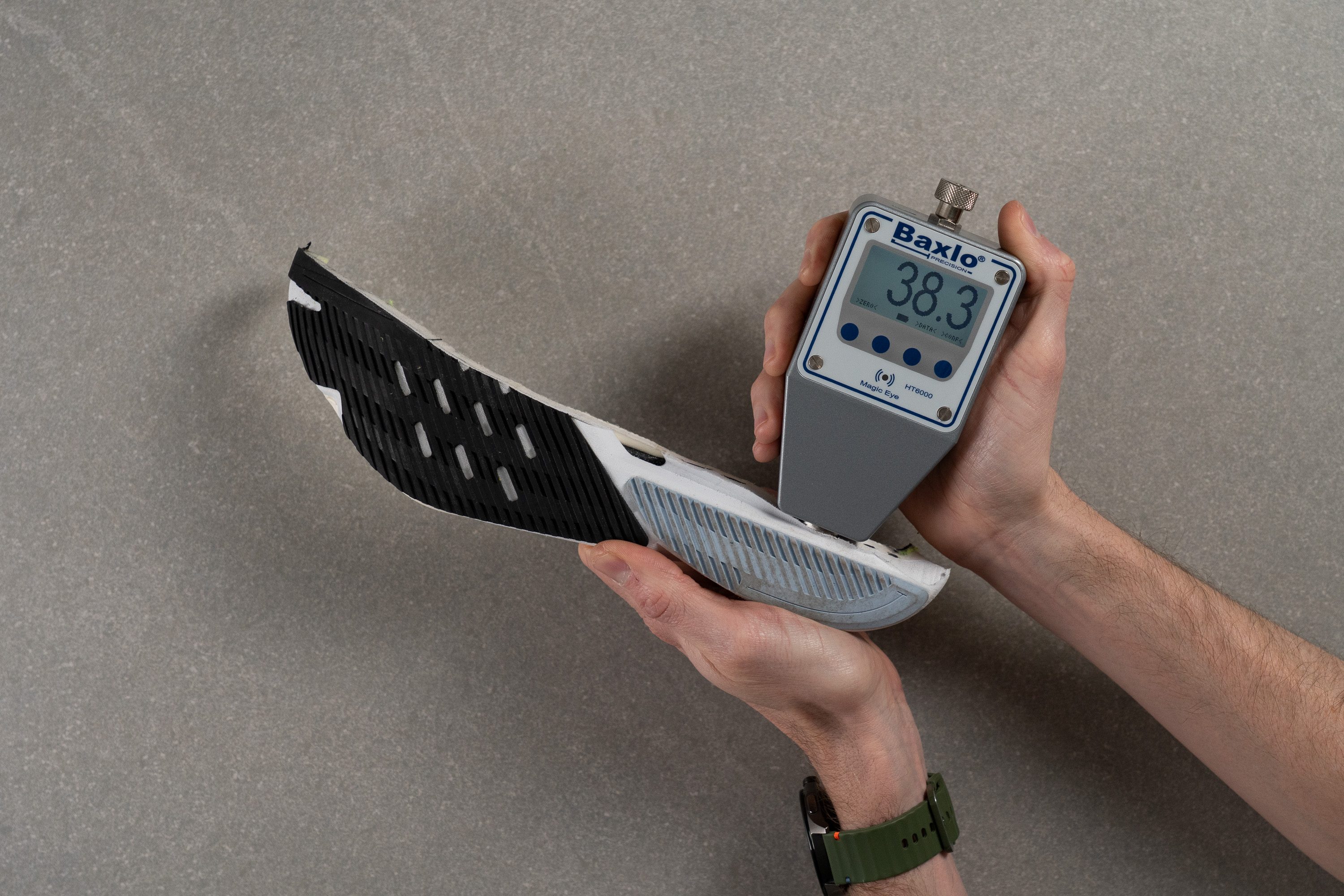
| Adizero Boston 12 | 38.3 AC |
| Average | 36.4 AC |
Secondary foam
UpdatedThe real standout in this shoe is the TPEE-based Lightstrike Pro. We've delved into this world-class foam in our advanced guide about midsoles. It boasts phenomenal energy return, remarkable durability, and an optimal balance in softness, which we gauged at 29.2 AC in the lab.
This is why the shoe feels notably better underfoot than its predecessors. It packs more Lightstrike Pro than ever, and in a softer formulation, too!
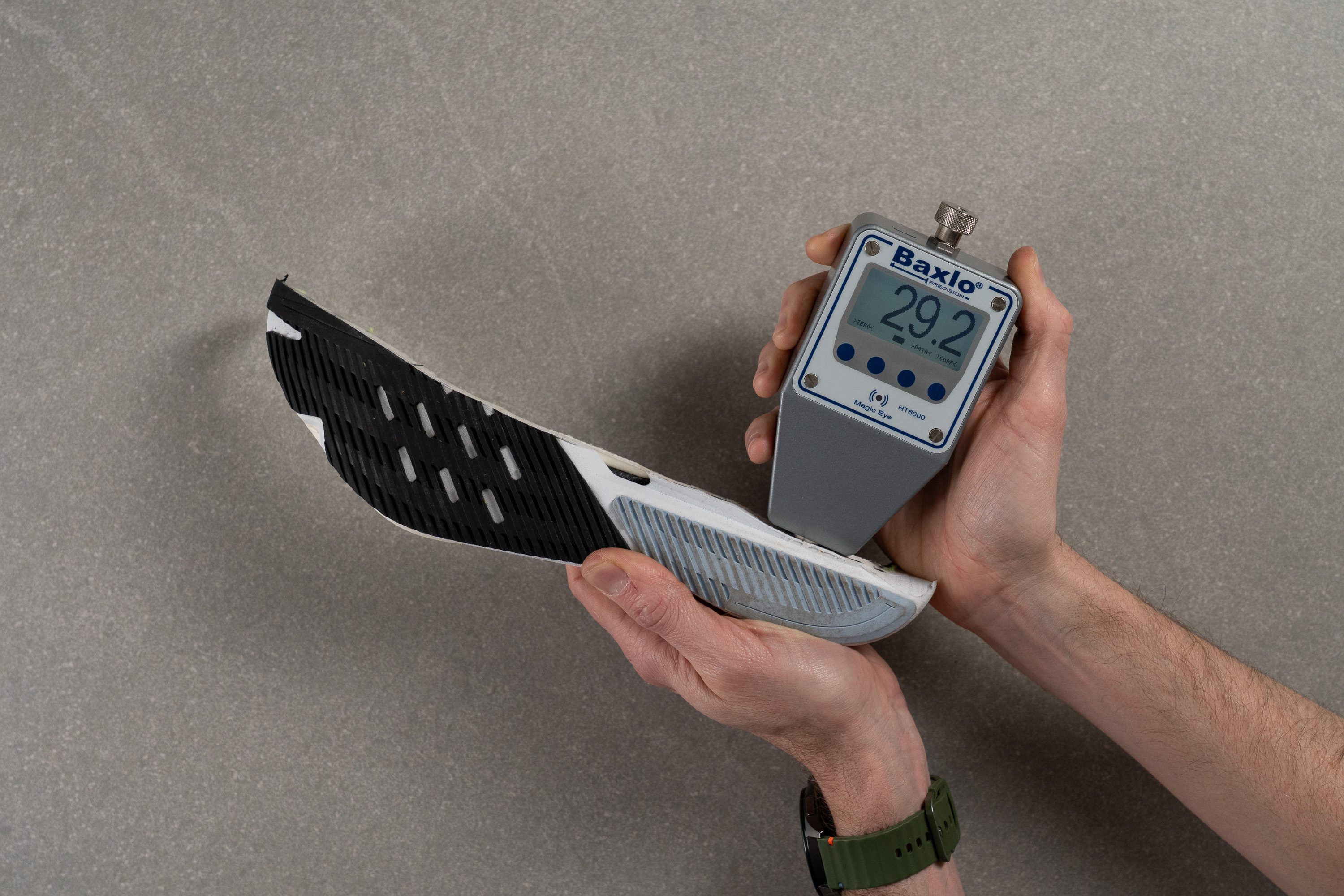
| Adizero Boston 12 | 29.2 AC |
| Average | 39.1 AC |
Size and fit
Size
Adidas Adizero Boston 12 fits slightly large (348 votes).
Internal length
At 269.4 mm, it matches quite remarkably with Adidas' size charts. This is a 100% a true-to-size shoe.
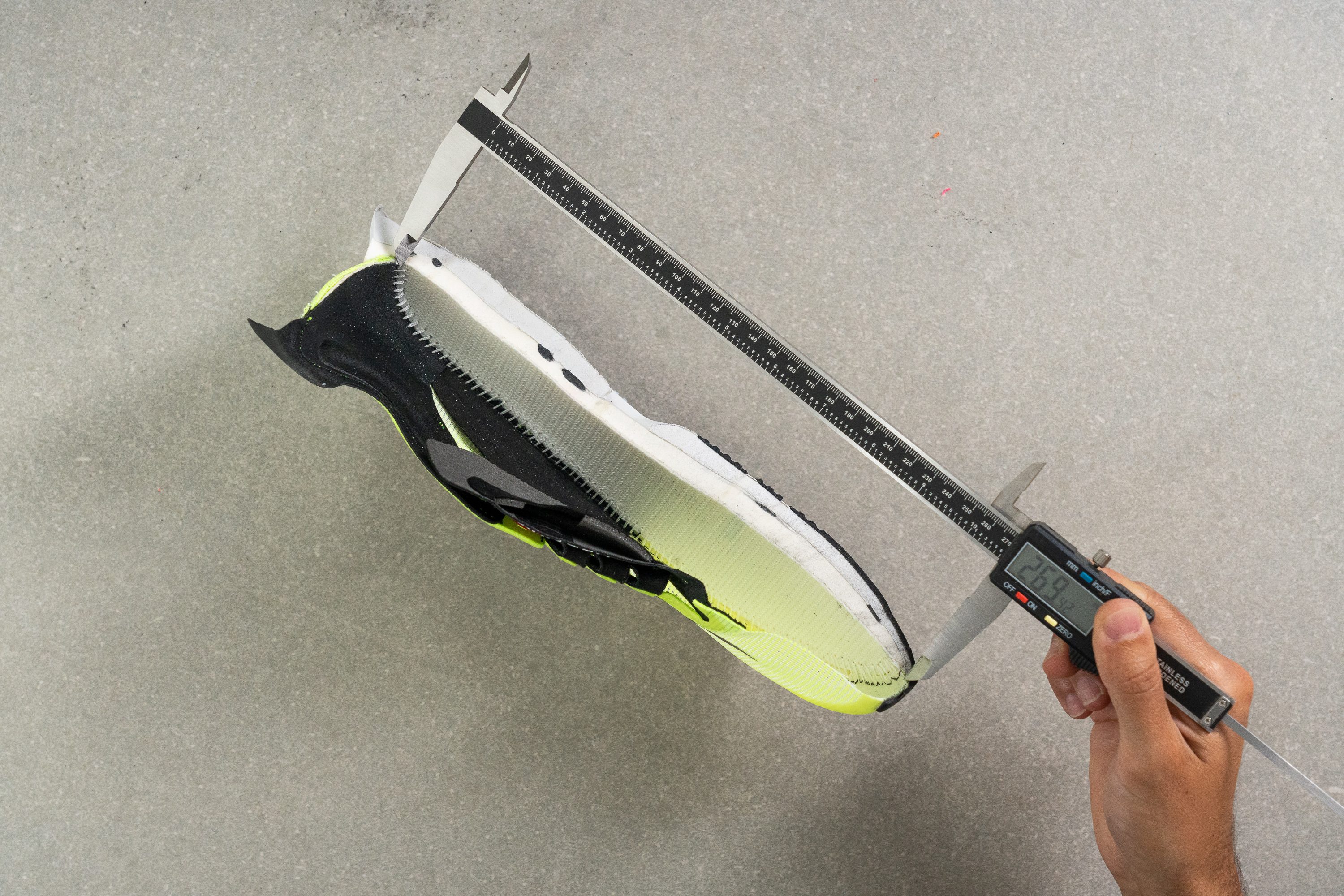
| Adizero Boston 12 | 269.4 mm |
| Average | 269.4 mm |
Width / Fit
The Boston 12 felt spacious right from the start, but for us, the key is to measure and extract all the data from every shoe, so let’s dive in.
We created a 1:1 mould of the Boston 12's interiors and measured 99.2 mm at its widest point. This measurement far exceeds the average shoe and even surpasses most tempo trainers. So far, the Boston 12 stands out as a promising option for runners with wide feet.
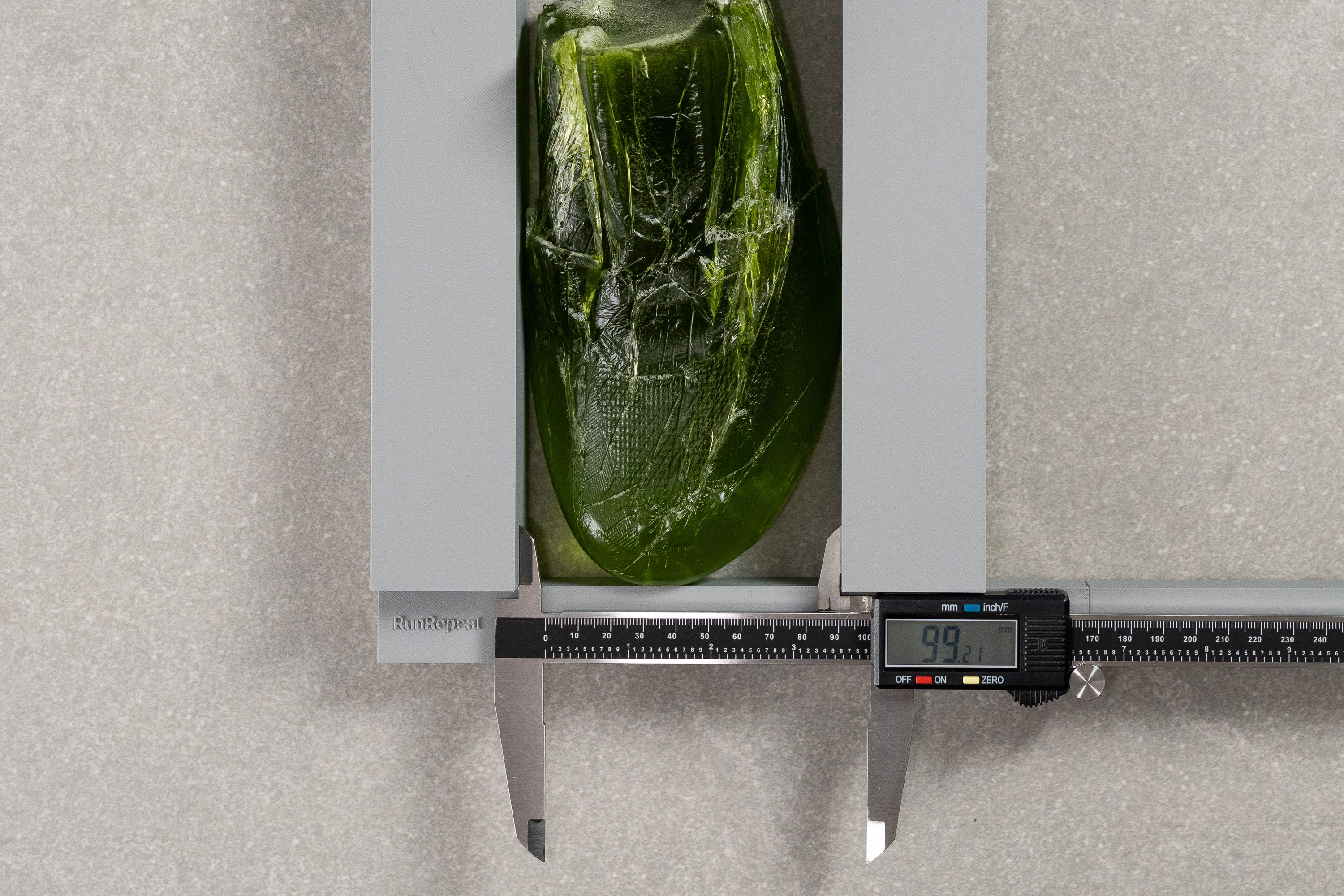
| Adizero Boston 12 | 99.2 mm |
| Average | 95.1 mm |
Toebox width
Our second measurement was 73.2 mm, landing right around the average. This reflects Adidas' classic, slightly pointy design, yet it still feels more spacious compared to many competitors.
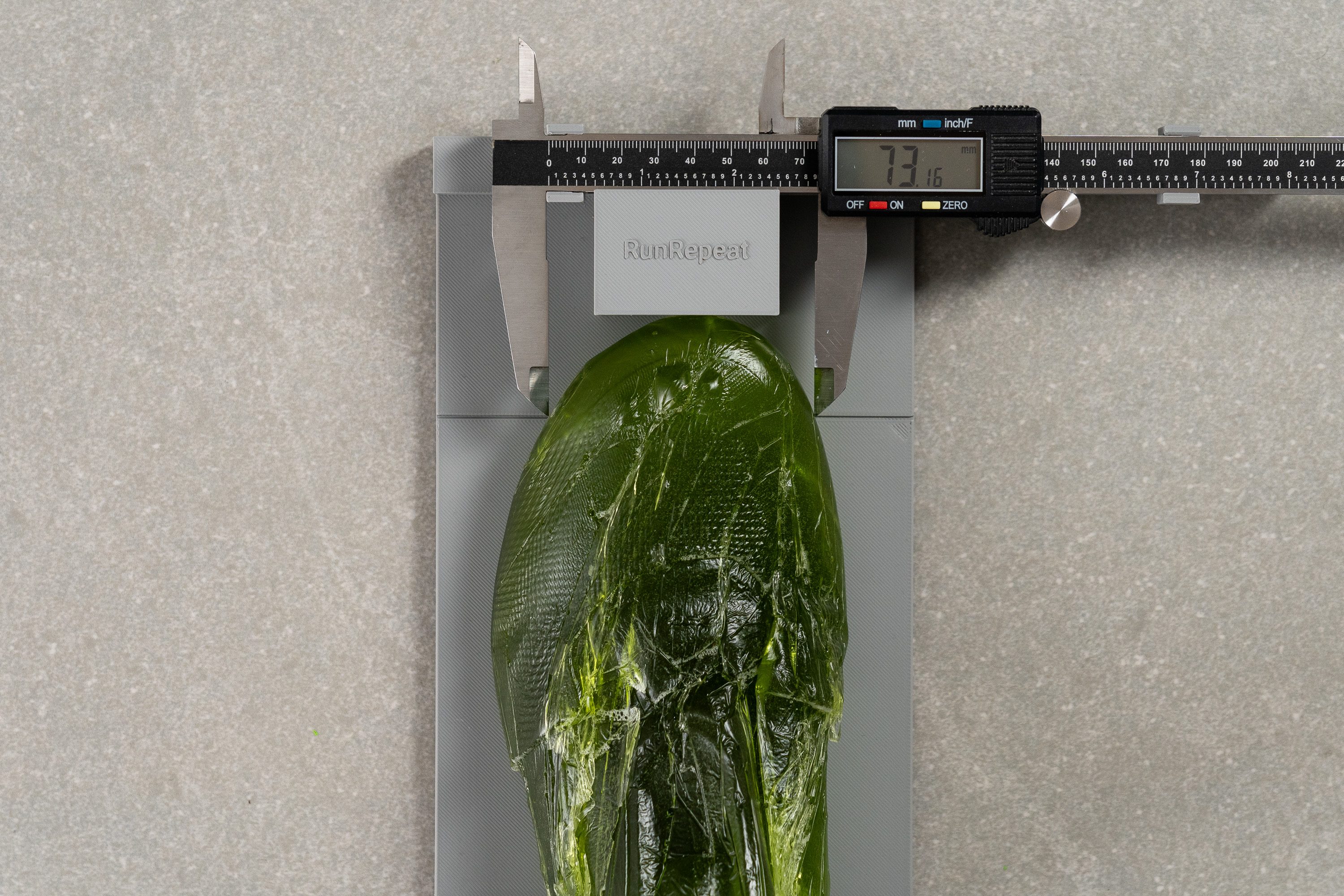
| Adizero Boston 12 | 73.2 mm |
| Average | 73.3 mm |
Toebox height
On the flip side, the toebox height measured a compact 25.8 mm in our vernier callipers. Combined with the non-stretchy material of this upper, it may feel restrictive for runners with higher-volume feet. That said, this result aligns perfectly with what we expect from a tempo running shoe.
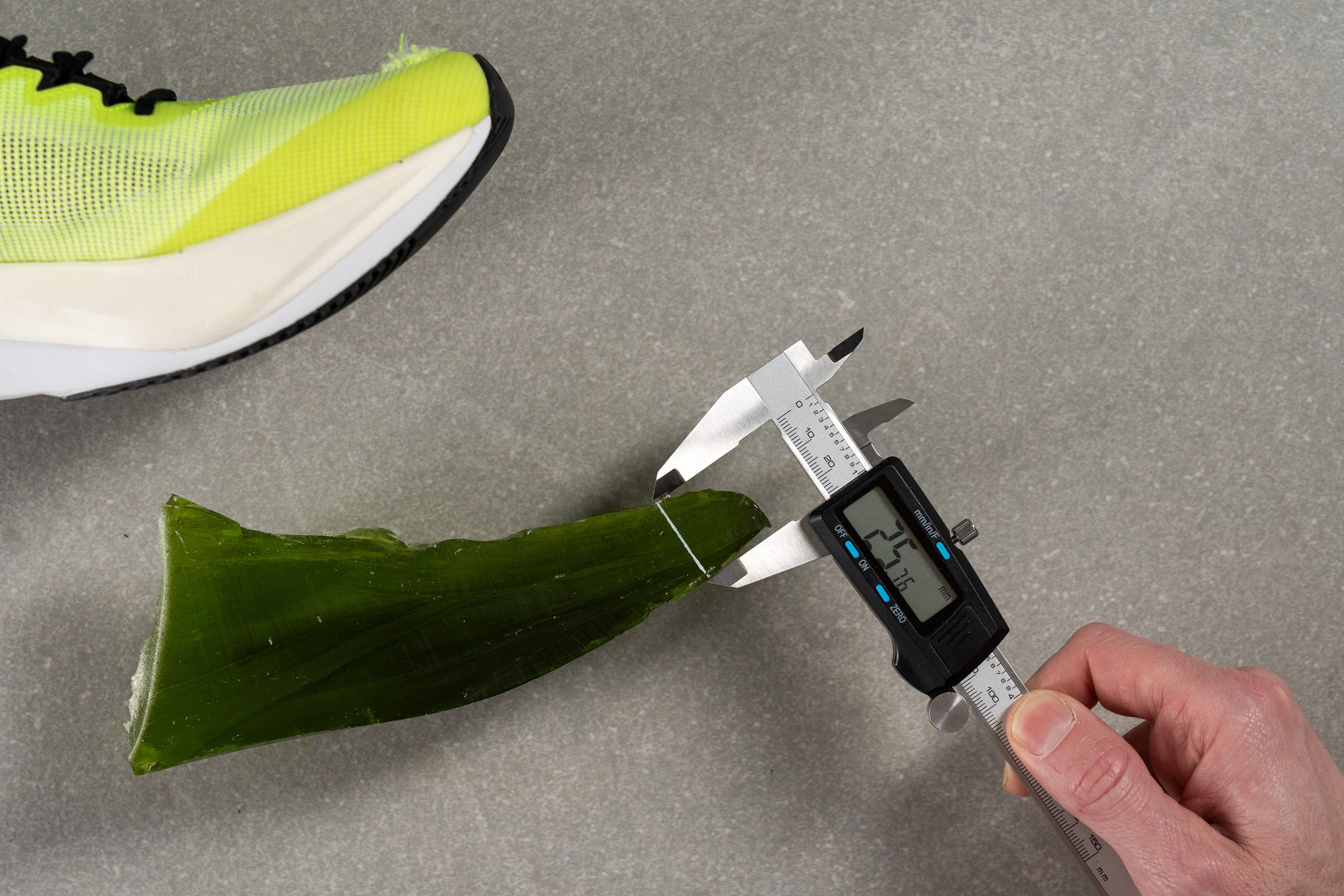
| Adizero Boston 12 | 25.8 mm |
| Average | 27.0 mm |
Traction / Grip
Traction test
Traction in the Boston v12 holds firm thanks to Continental rubber, which scored 0.57 in our demanding wet-grip test, making it a reliable choice no matter the weather.
| Adizero Boston 12 | 0.57 |
| Average | 0.49 |
Outsole design
This outsole from the Adizero Boston 12 uses a mix of Continental rubber and exposed foam to balance grip, durability, and weight.
Rubber is concentrated in high-wear areas, while the exposed foam around the midfoot reduces weight but may wear faster with aggressive footstrikes. The heel has two distinct rubber sections, giving it a segmented look that also helps with smoother landings and decoupling. Overall, it's a race-like design that prioritises performance but still has good coverage.
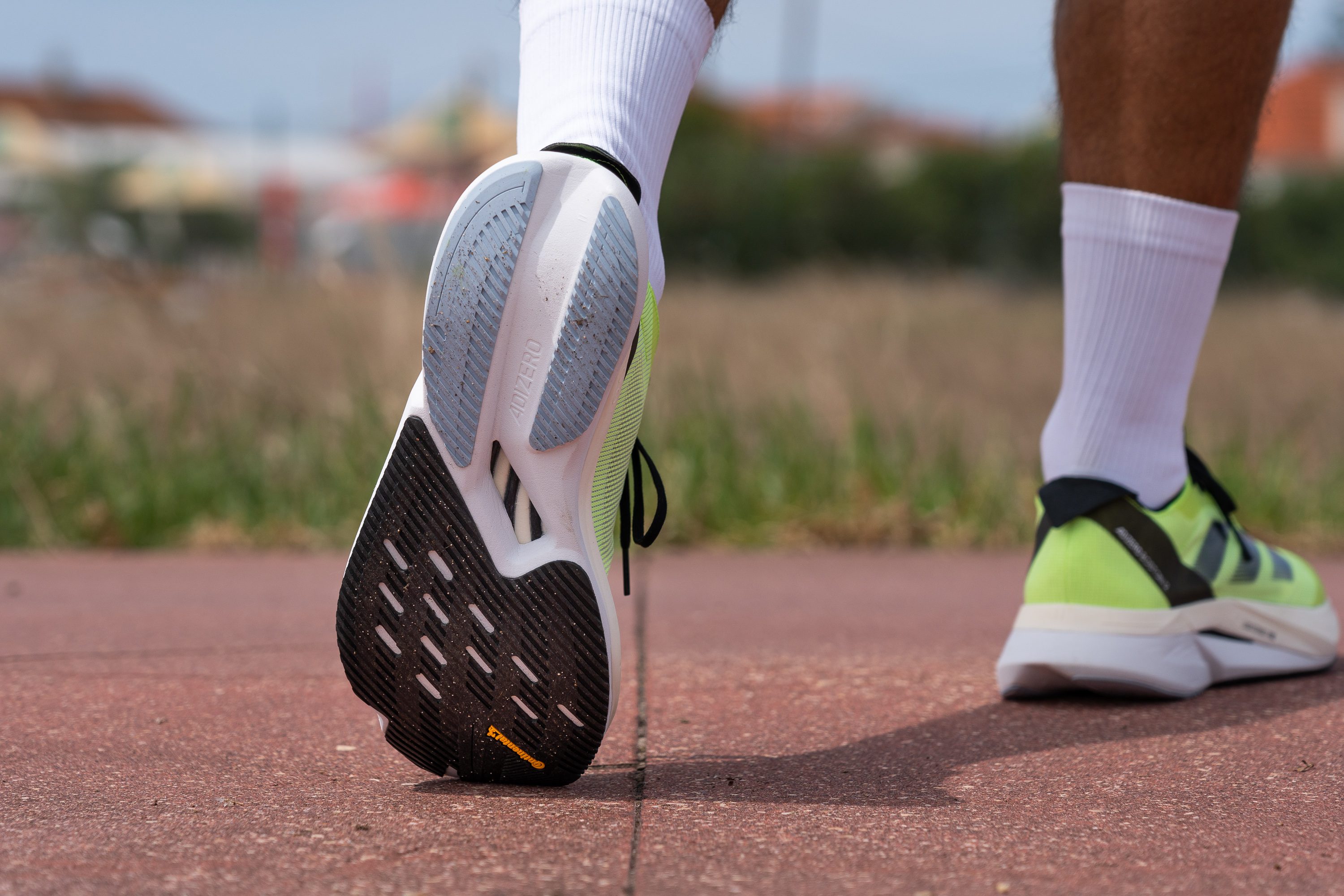
Flexibility / Stiffness
The Boston 12 packs stiff EnergyRods inside the midsole, offering a snappy ride that clearly favours quicker paces over slow jogging. We confirmed this with a 17.3N result in our flex test.
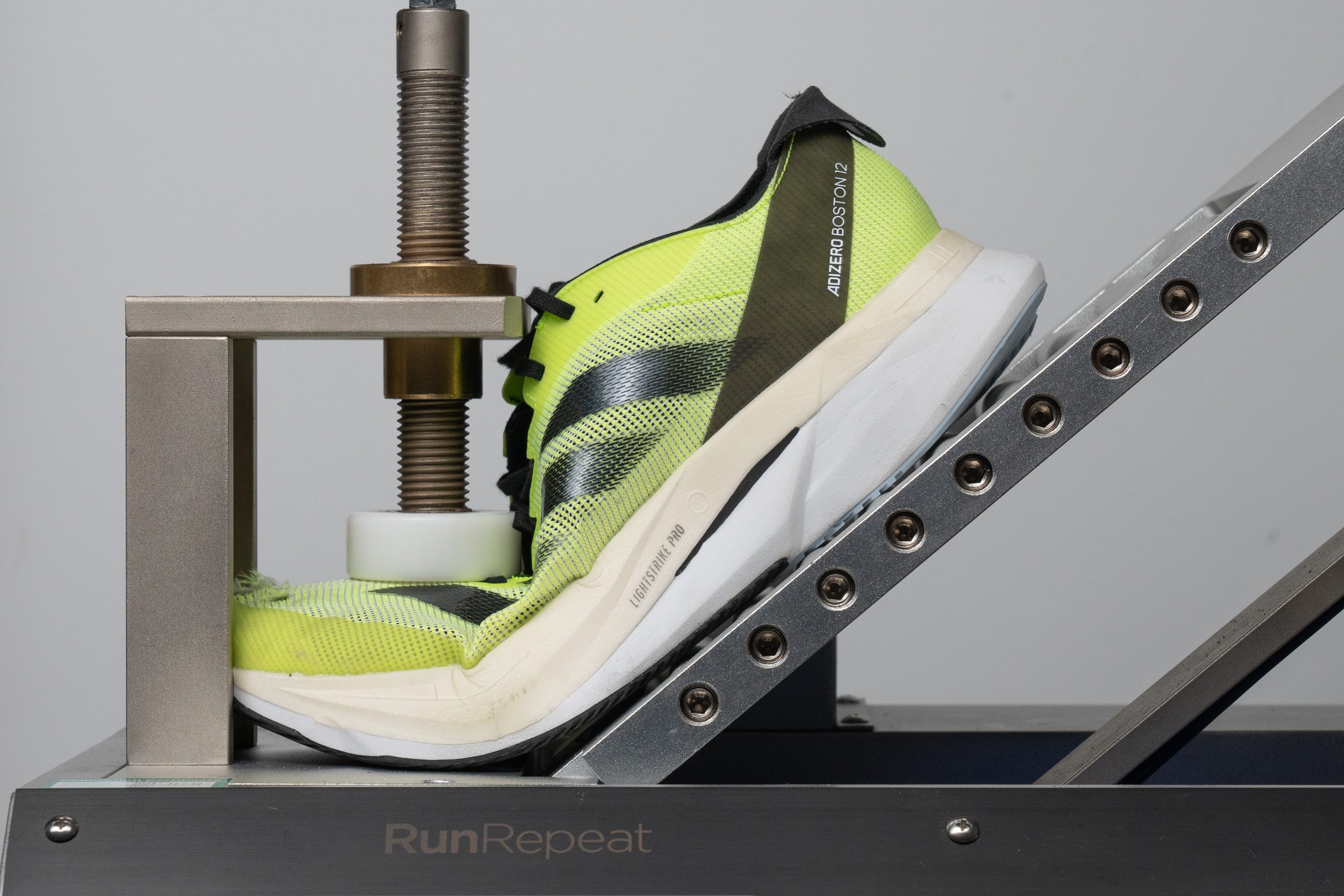
| Adizero Boston 12 | 17.3N |
| Average | 15.3N |
Stiffness in cold (%)
And no worries at all when it comes to chilly weather. Our measurement shows we only need a force of 33.3N to bend the Boston 12 to 90 degrees. That's even less than what it took to flex the Boston 11 in room-temperature conditions!
The gap between the two measurements shows an impressive 24.6% change. It's a monumental step up from last year's model, as it suffered a 42.0% increase in stiffness.
Undeniably, the introduction of the new Lightstrike 2.0 EVA foam played a substantial role in this success.
| Adizero Boston 12 | 25% |
| Average | 33% |
Weight
As we just mentioned, Adidas truly excelled in this area with the Boston 12. The shoe now comfortably falls under the 10 oz threshold, weighing in at only 9.2 oz or 261g. This makes it lighter than the average running shoe!
Now, we believe this true Boston model is ready to take on its peers in the arena of lightweight tempo trainers like the crowd-favourite Saucony Endorphin Speed 3.
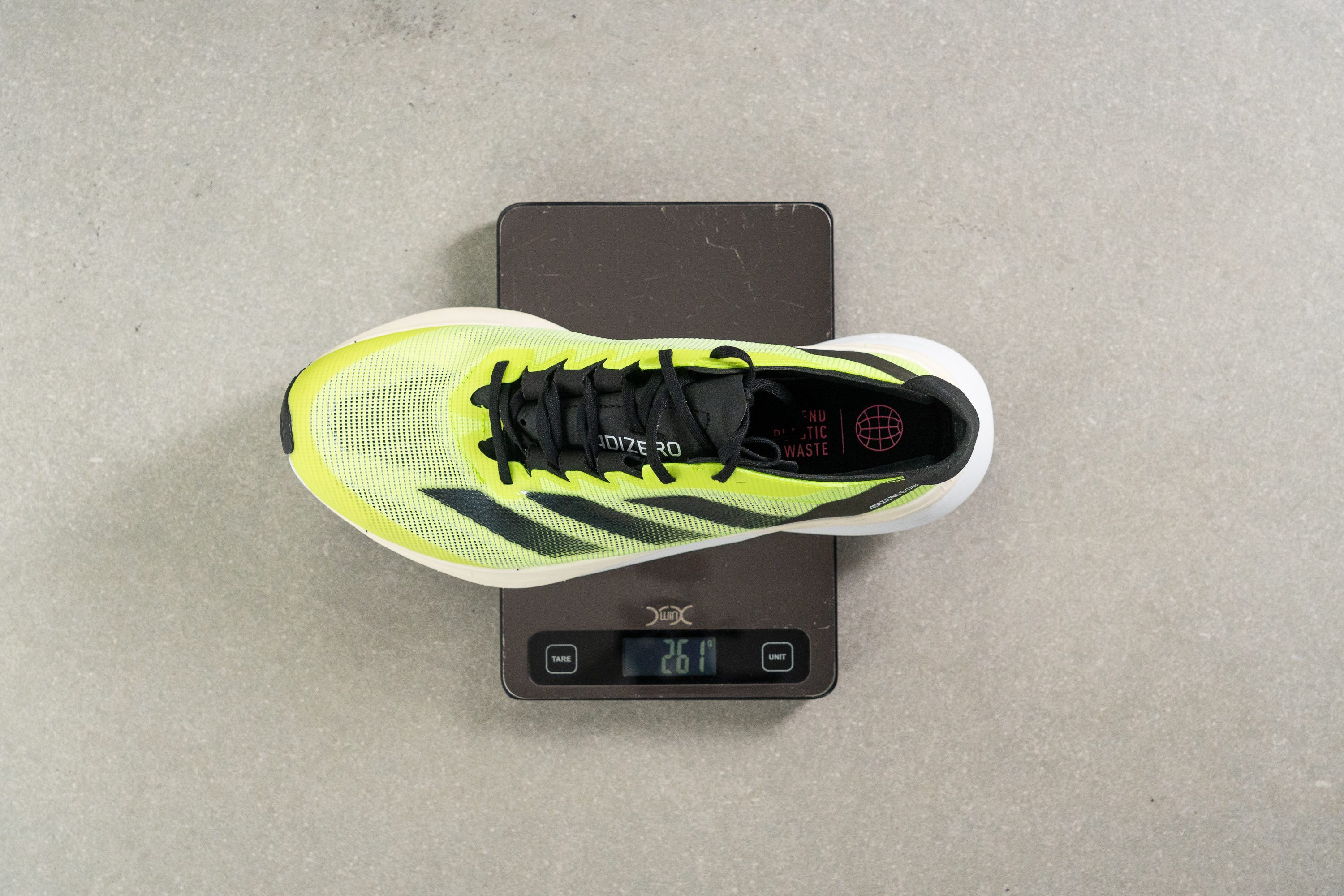
| Adizero Boston 12 | 9.2 oz (261g) |
| Average | 9.3 oz (264g) |
Breathability
Absolutely AMAZING. That's the best way to describe the breathability of the Adidas Adizero Boston 12, based on our smoke-machine test results in the lab. It earned a perfect score—5 out of 5.
The light test also confirmed this outstanding breathability. The upper's thinness was easily observed as the light passed right through.
After reviewing the upper, we noticed eight well-placed ventilation holes on the sides—an important addition to boost airflow in this often-overlooked area.
To delve deeper, we took out our trusty microscope to explore the shoe's impressive ventilation.
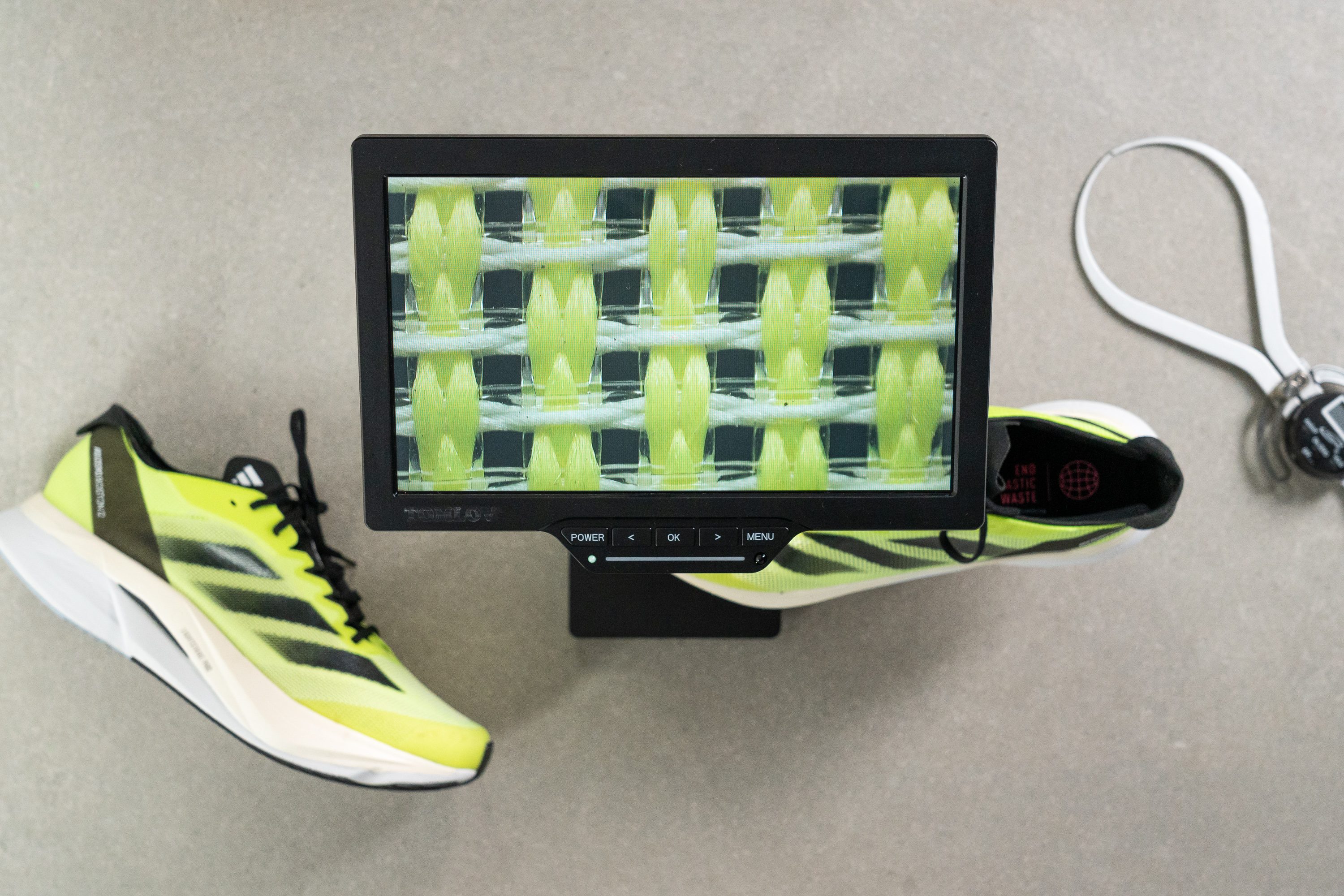
What we found was a remarkably thin and breathable mesh from Adidas. Clearly, there's no need to have huge ventilation holes in the upper with this clever design in place.
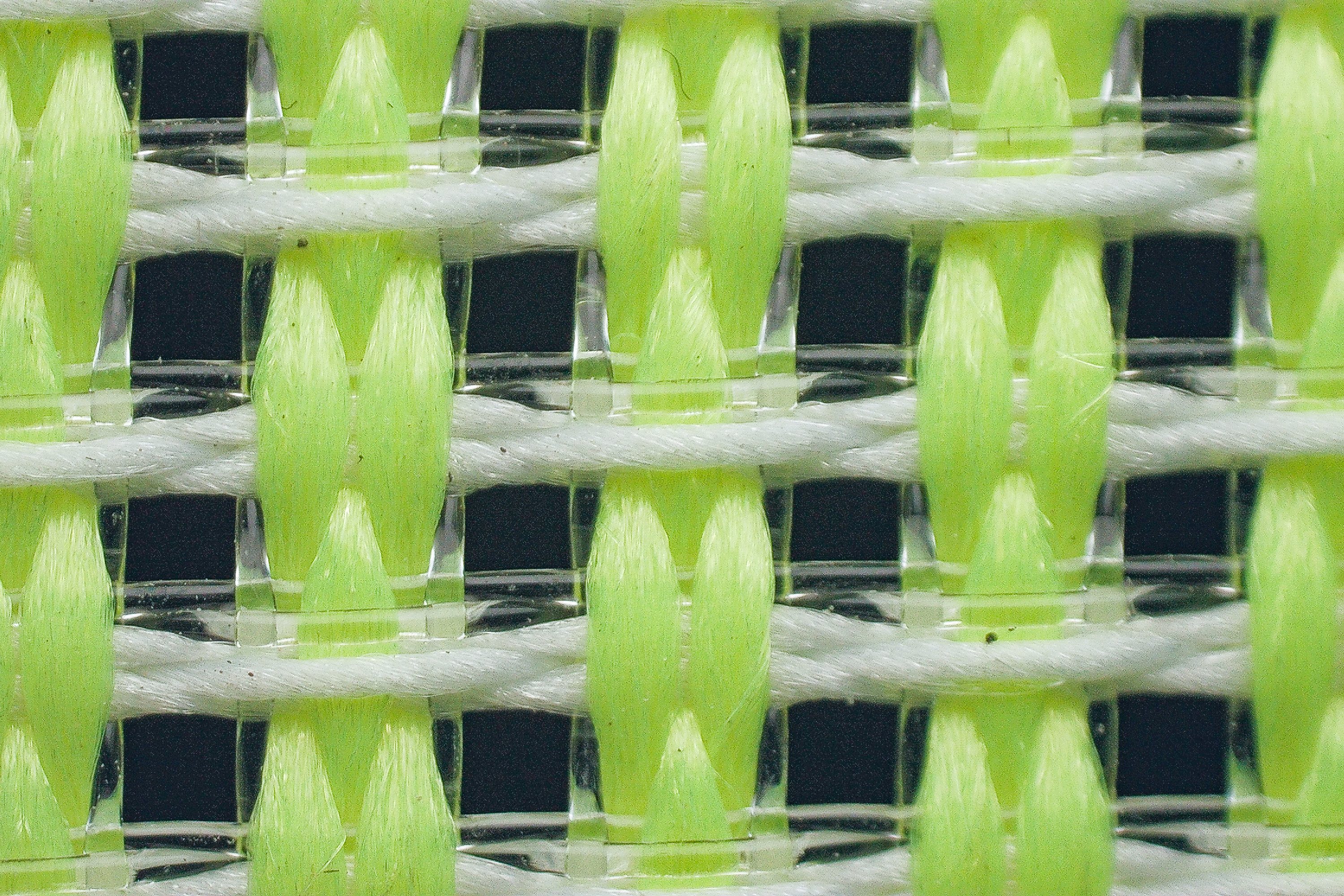
| Adizero Boston 12 | 5 |
| Average | 3.7 |
Stability
At 269.4 mm, it matches quite remarkably with Adidas' size charts. This is a 100% a true-to-size shoe.
Lateral stability test
We firmly believe that the Boston remains an impressively stable shoe, especially considering its elevated height.
Through our static tests and fast-paced test runs, we consistently experienced a reassuring sense of balance.
Torsional rigidity
When we applied torsional force to the shoe, it readily resisted twisting and we rated it at 4/5.
Despite this, the Boston 12 displays slightly more flexibility than its predecessor, and that's a positive change. The reason for this lies in the shoe's Energyrods. The current model uses full-length fibreglass Energyrods, which are not quite as rigid as the combination of a carbon-fibre plate and Energyrods featured in the previous model.
| Adizero Boston 12 | 4 |
| Average | 3.5 |
Heel counter stiffness
In the shoe's heel, we discovered a counter stiffness more akin to that of racing shoes. It didn't resist our applied force at all. On a scale where 5 is the stiffest, we'd rate this a mere 1.
Heel strikers might have preferred a rating of 2 or 3 out of 5 to improve stability. But, as we've already mentioned, Adidas seems to have designed this shoe with midfoot or forefoot strikers in mind.
| Adizero Boston 12 | 1 |
| Average | 2.9 |
Midsole width - forefoot
And here's more evidence of this focus. We measured the landing platform in the forefoot of this shoe at a whopping 118.2 mm, providing significant stability for midfoot or forefoot strikers.
Take the Boston 11, for example. We measured its landing platform at 109.3 mm, which is narrower than most shoes. However, this 12th edition is among the widest shoes we've ever measured.
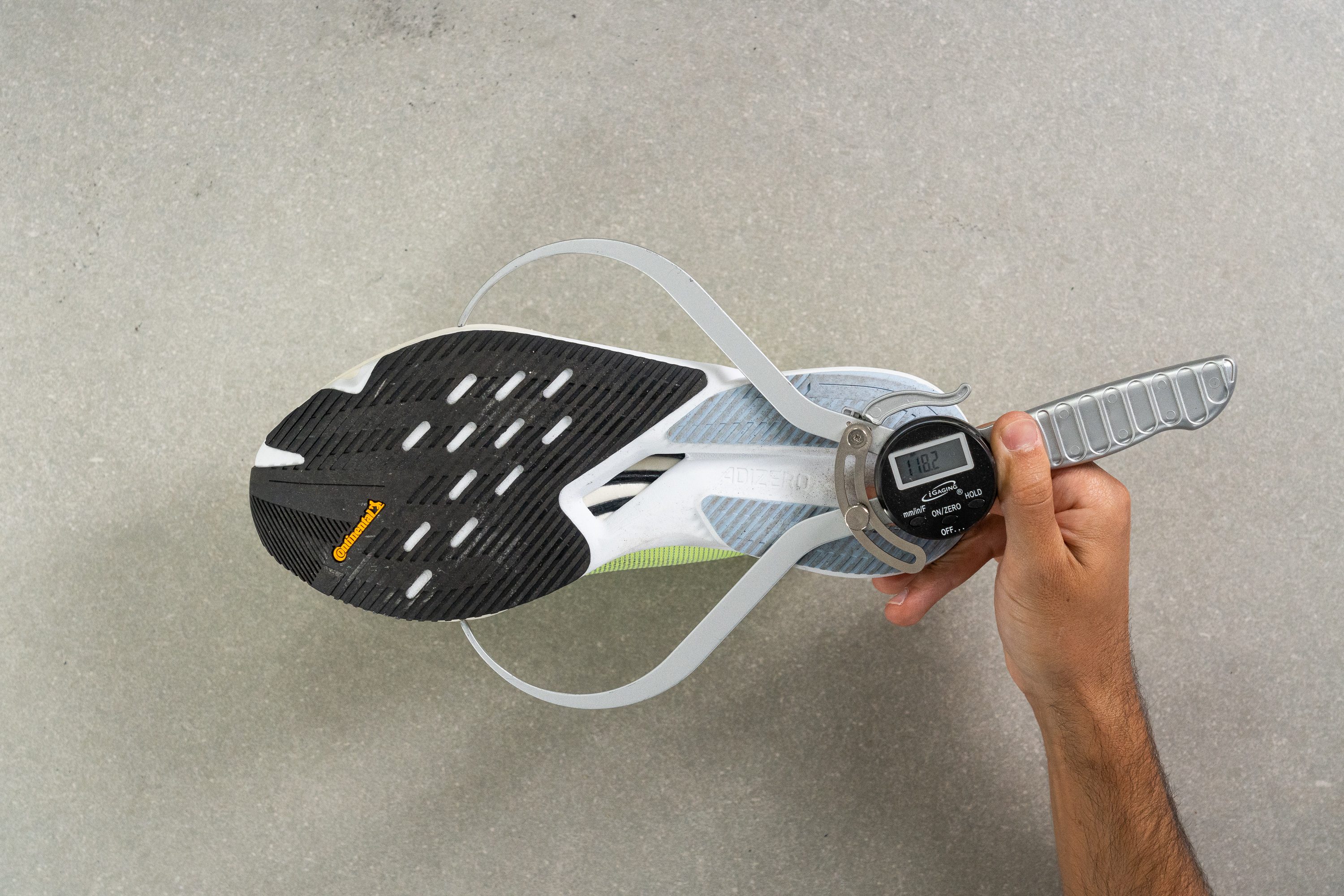
| Adizero Boston 12 | 118.2 mm |
| Average | 114.4 mm |
Midsole width - heel
In contrast, the heel remains moderately narrow in true Adidas style. We measured it at 86.0 mm.
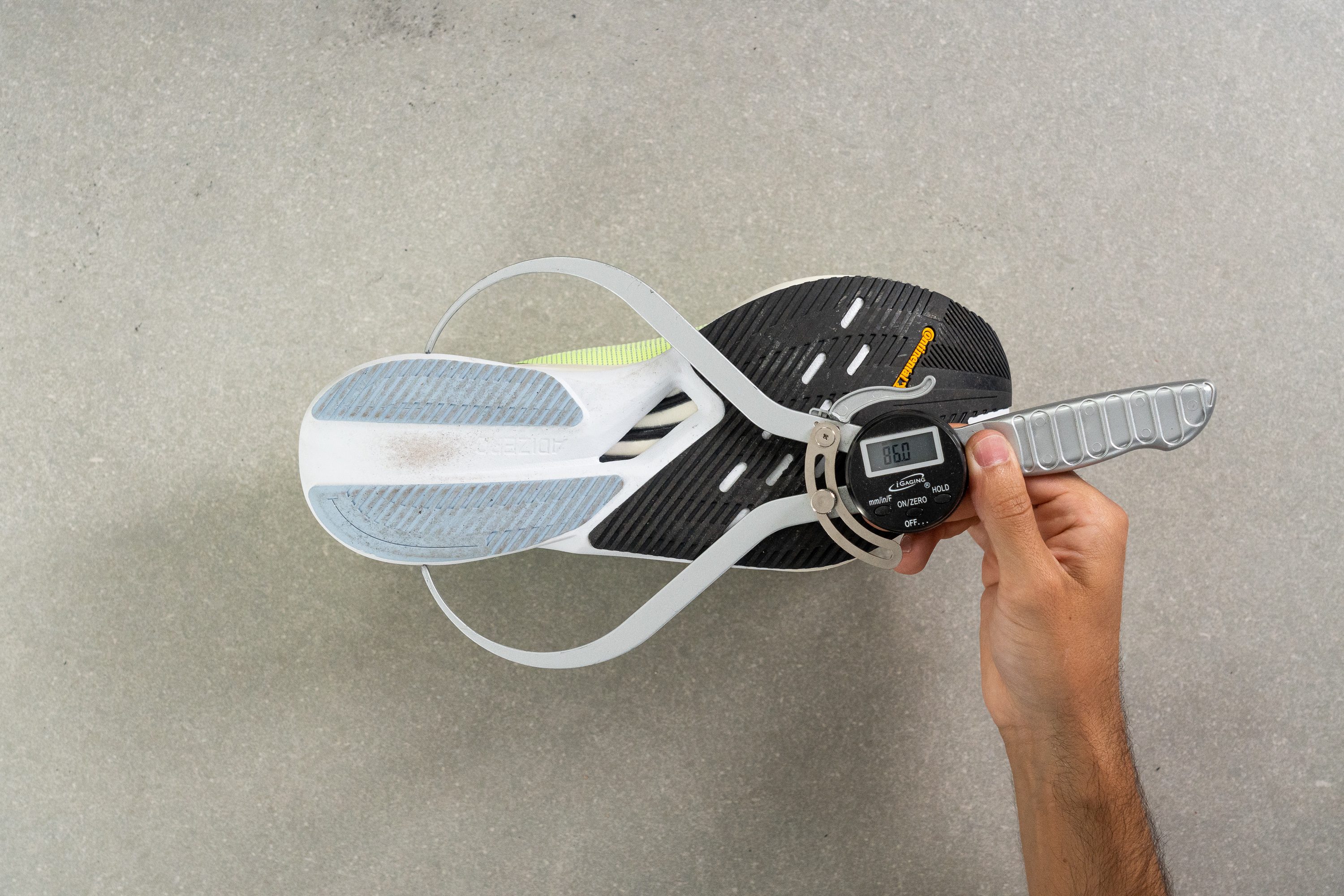
| Adizero Boston 12 | 86.0 mm |
| Average | 90.6 mm |
Durability
Toebox durability
We're disappointed that the durability issues we saw with the Adizero Boston 11 persist in the Boston 12, which led us to give it a low score of 1 out of 5.
It's clear to us that Adidas has the technology and know-how to create a thin-yet-robust upper for the Boston 13, similar to what Nike achieved with the Alphafly 2. We can only hope they step up their game for the next release.
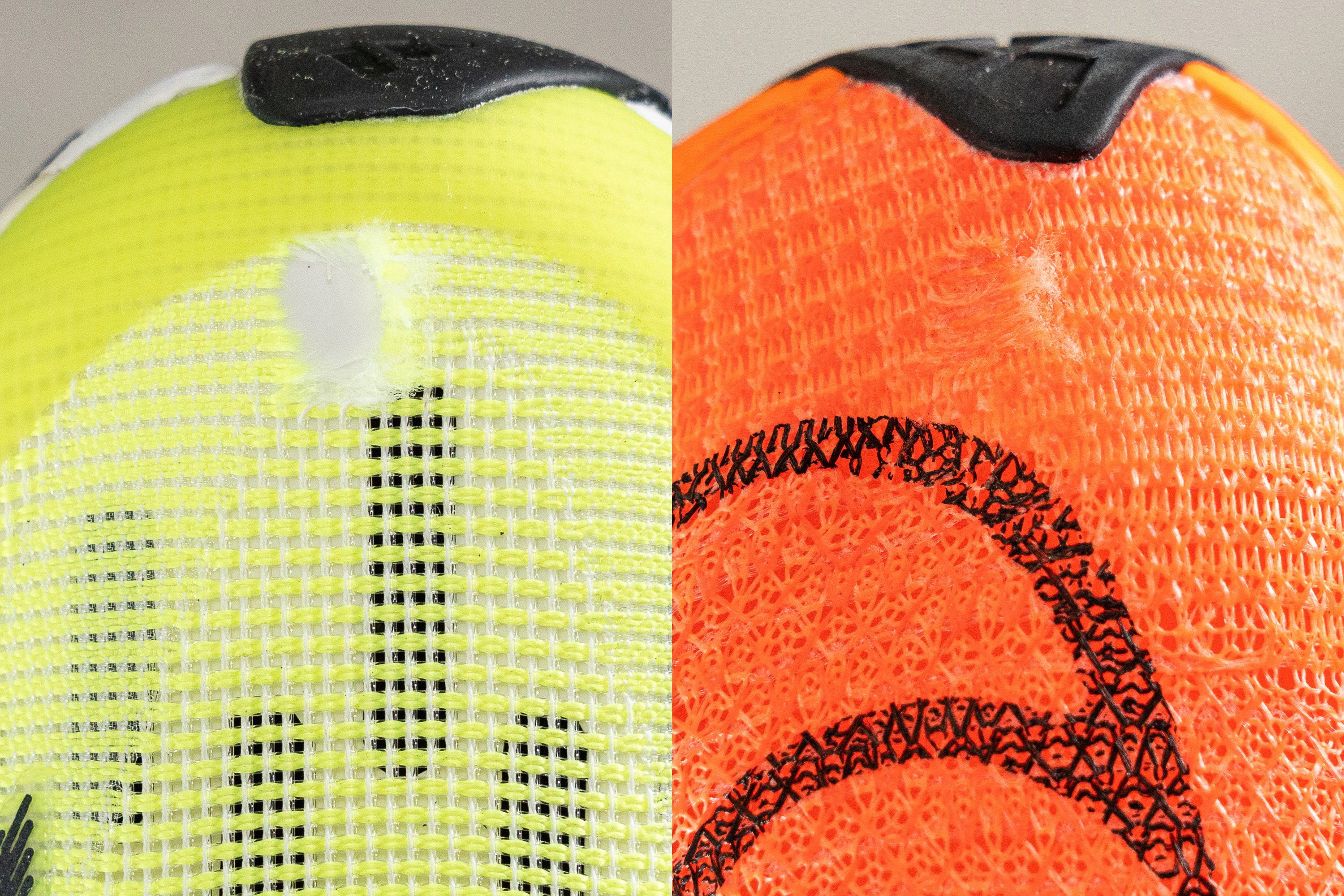
| Adizero Boston 12 | 1 |
| Average | 2.6 |
Heel padding durability
To our pleasant surprise, the heel padding proved to be significantly more resilient than we anticipated, especially after the disappointment of our previous Dremel test.
In our usual procedure of applying 3.2N for four seconds at a brisk 10,000 RPM, the Boston 12 stood impressively, demonstrating a commendable level of durability in the heel counter. And the comparison against the Hoka Gaviota 4 speaks for itself.
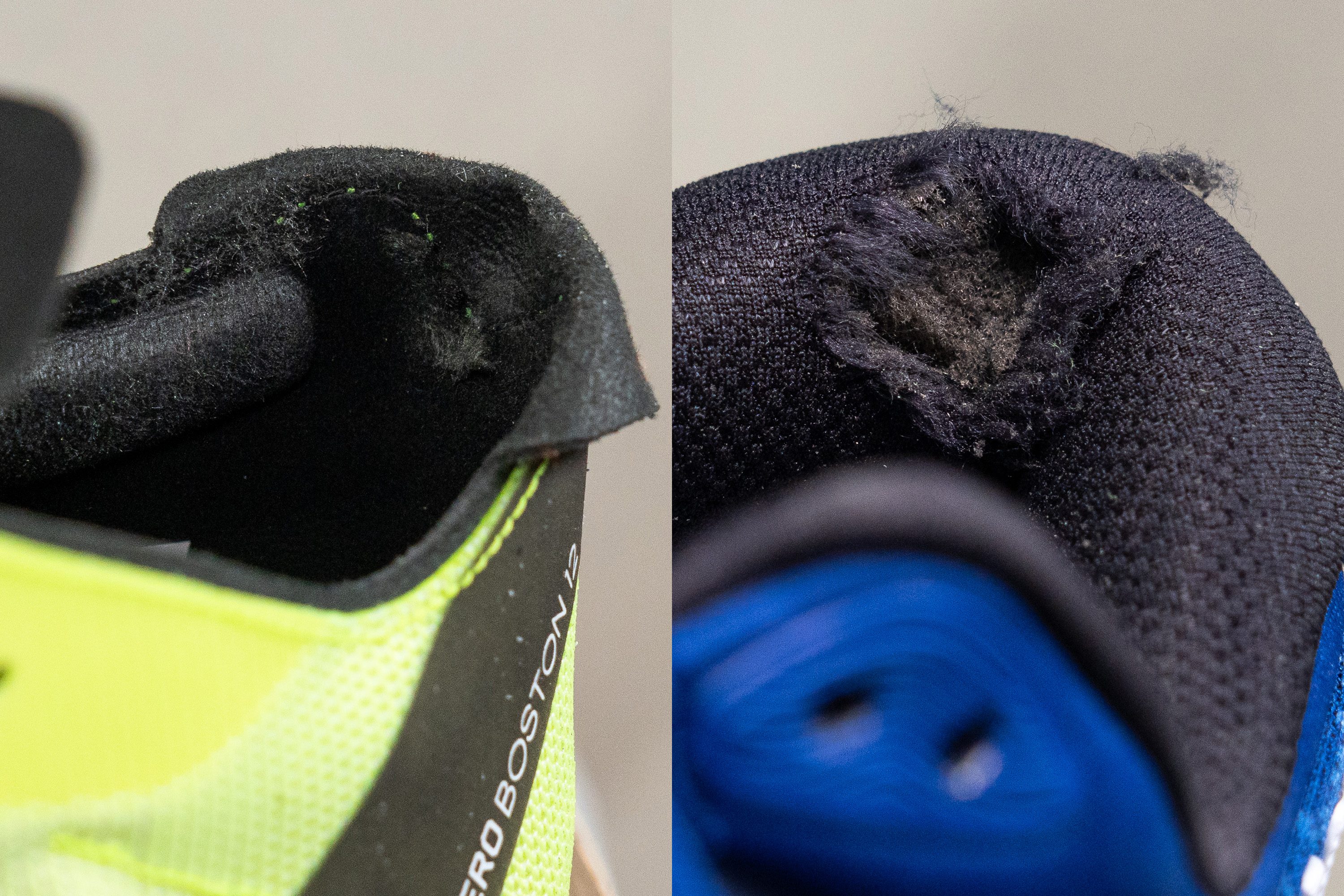
| Adizero Boston 12 | 3 |
| Average | 3.4 |
Outsole hardness
Undoubtedly, the most applauded feature of the Boston 12's predecessor was its outsole, a durable-yet-grippy rubber that only a select few shoes can claim to have as of today.
With the v12, we observed some changes. Given the exceptional durability of the Boston 11, Adidas trusted Continental to create a softer compound for the Boston 12 that we measured at 79.8 HC—8% softer than v11 . It's a clear attempt to enhance an already high-performing outsole, and it worked wonders.
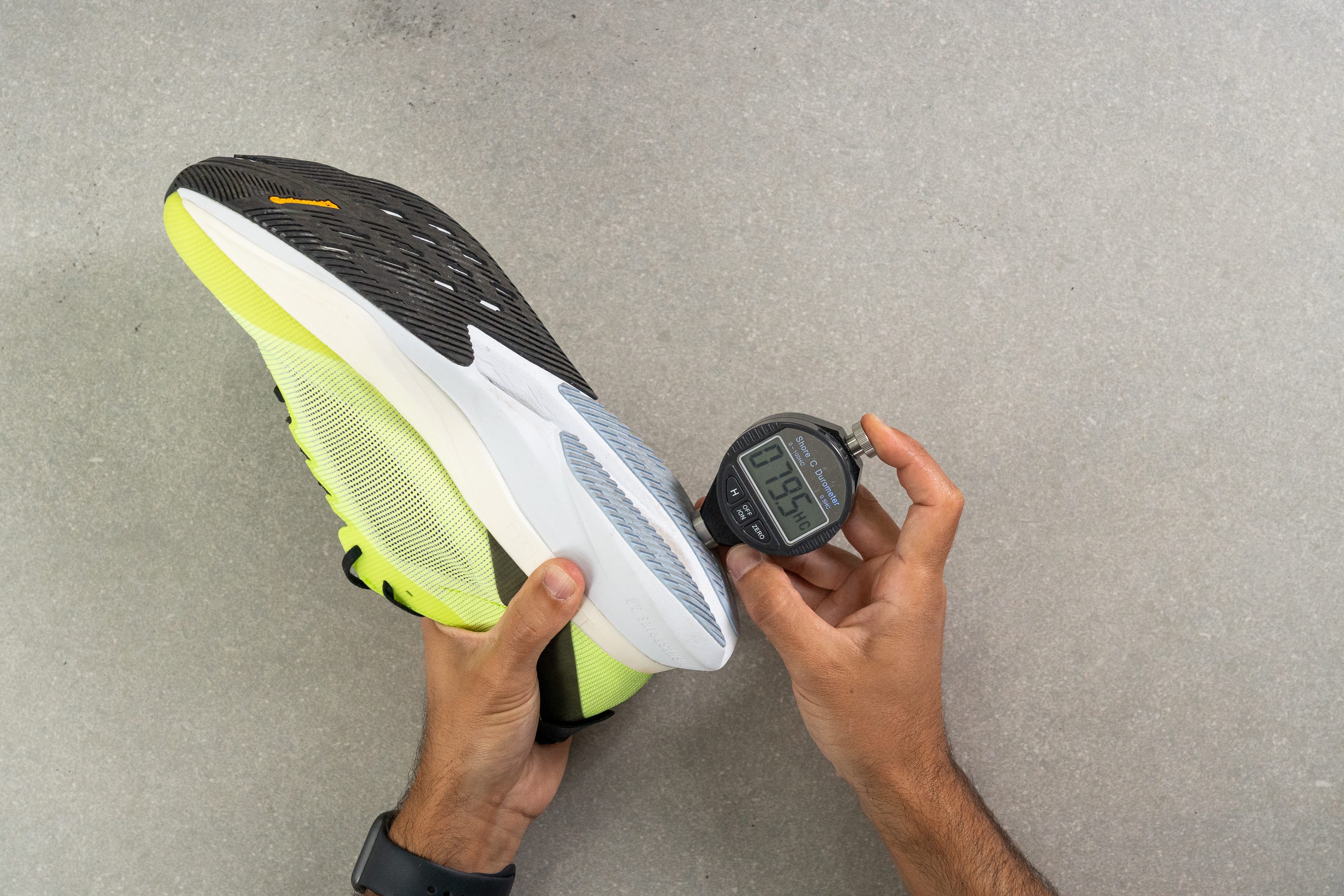
| Adizero Boston 12 | 79.8 HC |
| Average | 79.2 HC |
Outsole durability
But how can we be certain that the durability remains incredibly impressive? It's because we put it through rigorous testing in our lab. We used our Dremel test once more, this time to gauge the amount of rubber that vanished post-abrasion.
The final outcome was nothing short of astounding: despite its softer formulation, the Dremel only succeeded in creating a mere 0.7 mm dent, which is less than the 0.74 mm measured on the Boston 11.
This result shines brightly when compared to the average shoe, affirming the extraordinary durability of the Boston 12.
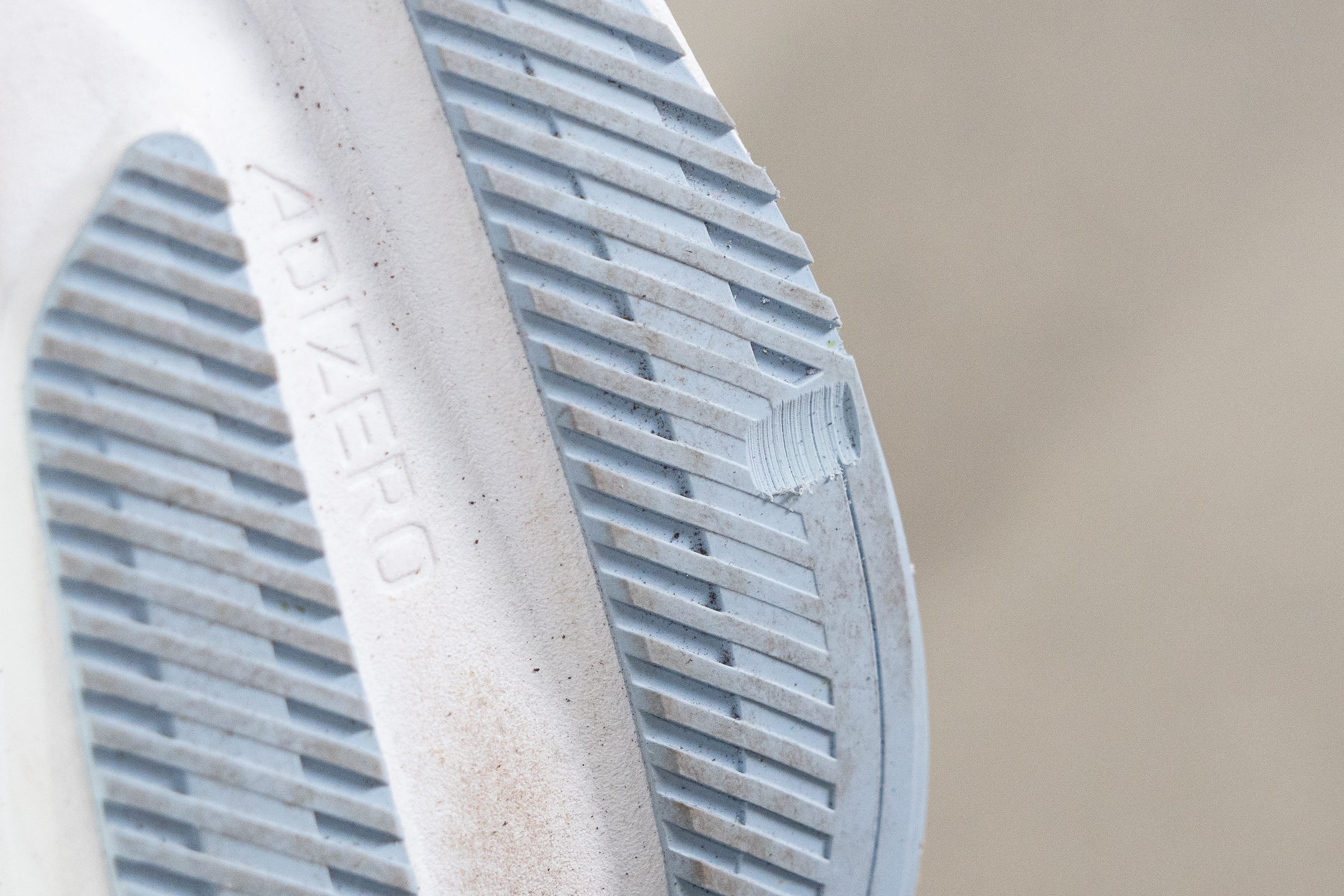
| Adizero Boston 12 | 0.7 mm |
| Average | 1.1 mm |
Outsole thickness
A common critique of the revamped Boston series—after its longstanding status as a low-stack shoe—has been the increased weight. We fondly remember the nimble and lightweight models like the Boston 9, and the latest two versions felt significantly bulkier in comparison.
There are 2 possible weight-saving options for any outsole:
- Minimise the thickness of the rubber.
- Increase the amount of exposed foam.
Adidas chose the first path, decreasing the outsole thickness from 3.3 mm to 2.8 mm in this version.
We've found this approach particularly effective, and in light of the exceptional durability exhibited by the Boston 12, we anticipate that Adidas might reduce the thickness even more in the next iteration.
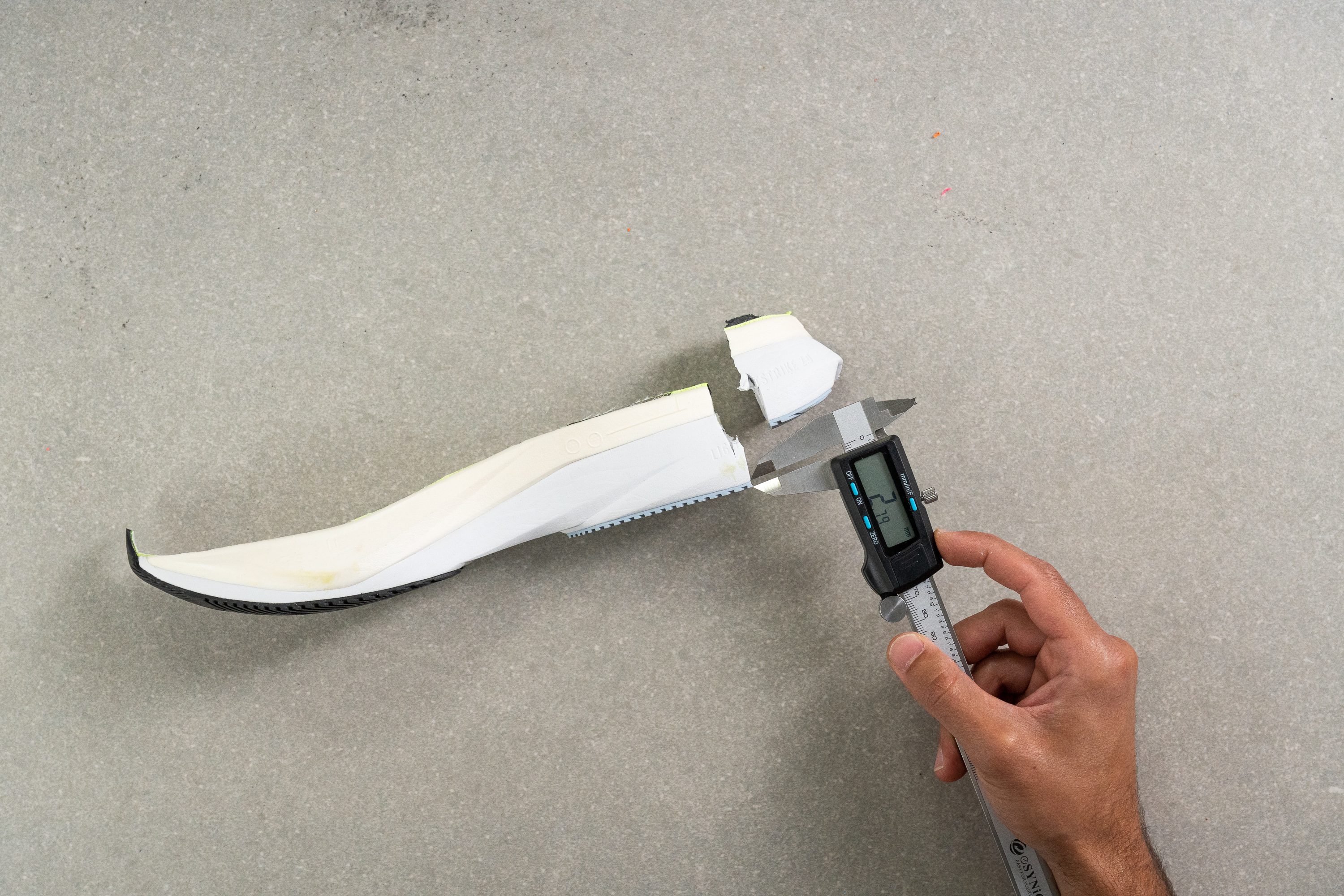
| Adizero Boston 12 | 2.8 mm |
| Average | 3.2 mm |
Misc
Insole thickness
In the Boston 12, the insole is exactly what we expect from a tempo shoe. At 3.8 mm, we found it a tad thinner than what you'd find in a daily trainer, yet it's comfortably capable of supporting long runs.
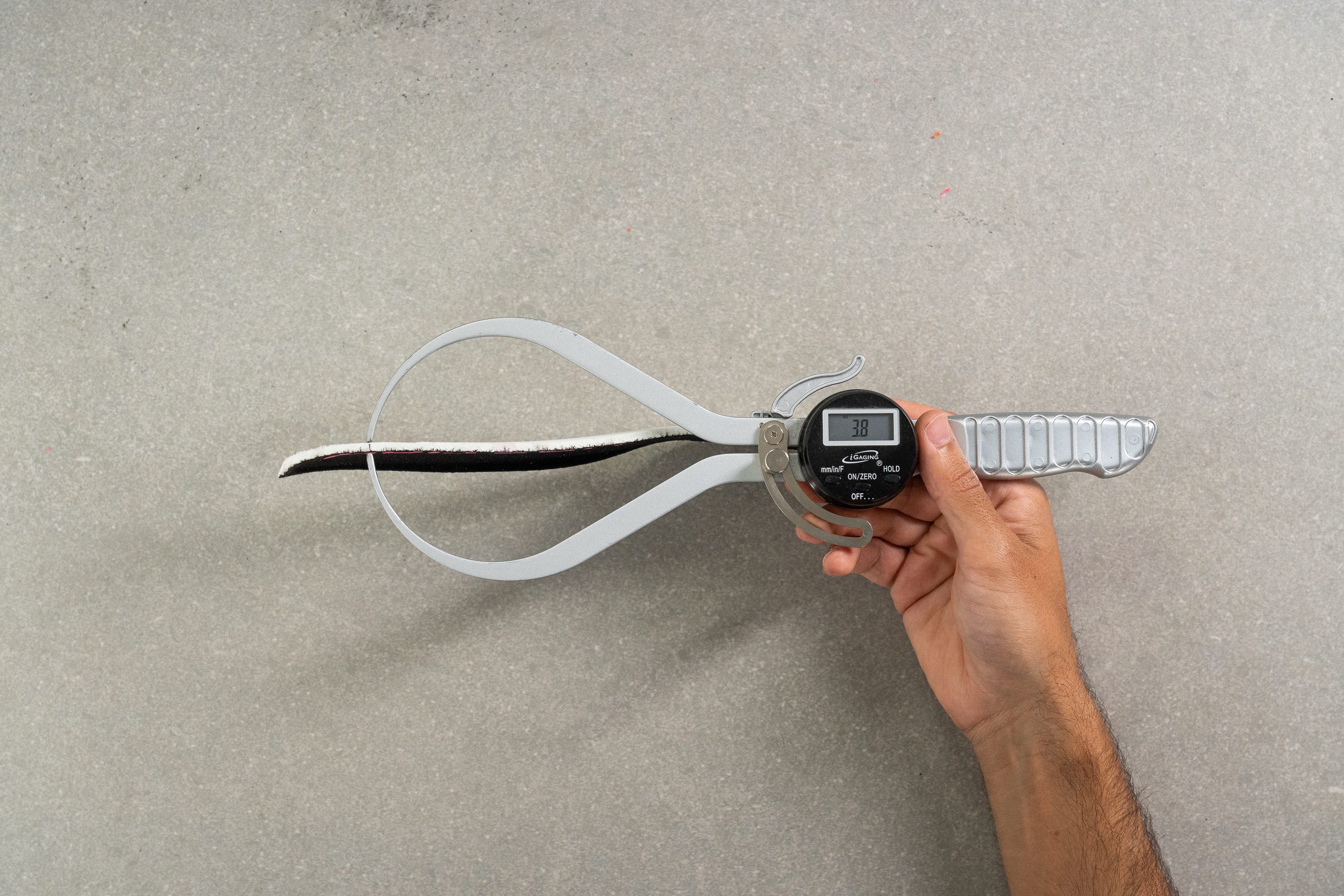
| Adizero Boston 12 | 3.8 mm |
| Average | 4.5 mm |
Removable insole
Whether you prefer to use our own orthotics or a different shoe insole, it's no issue, because the Boston 12's insole isn't glued down at all.
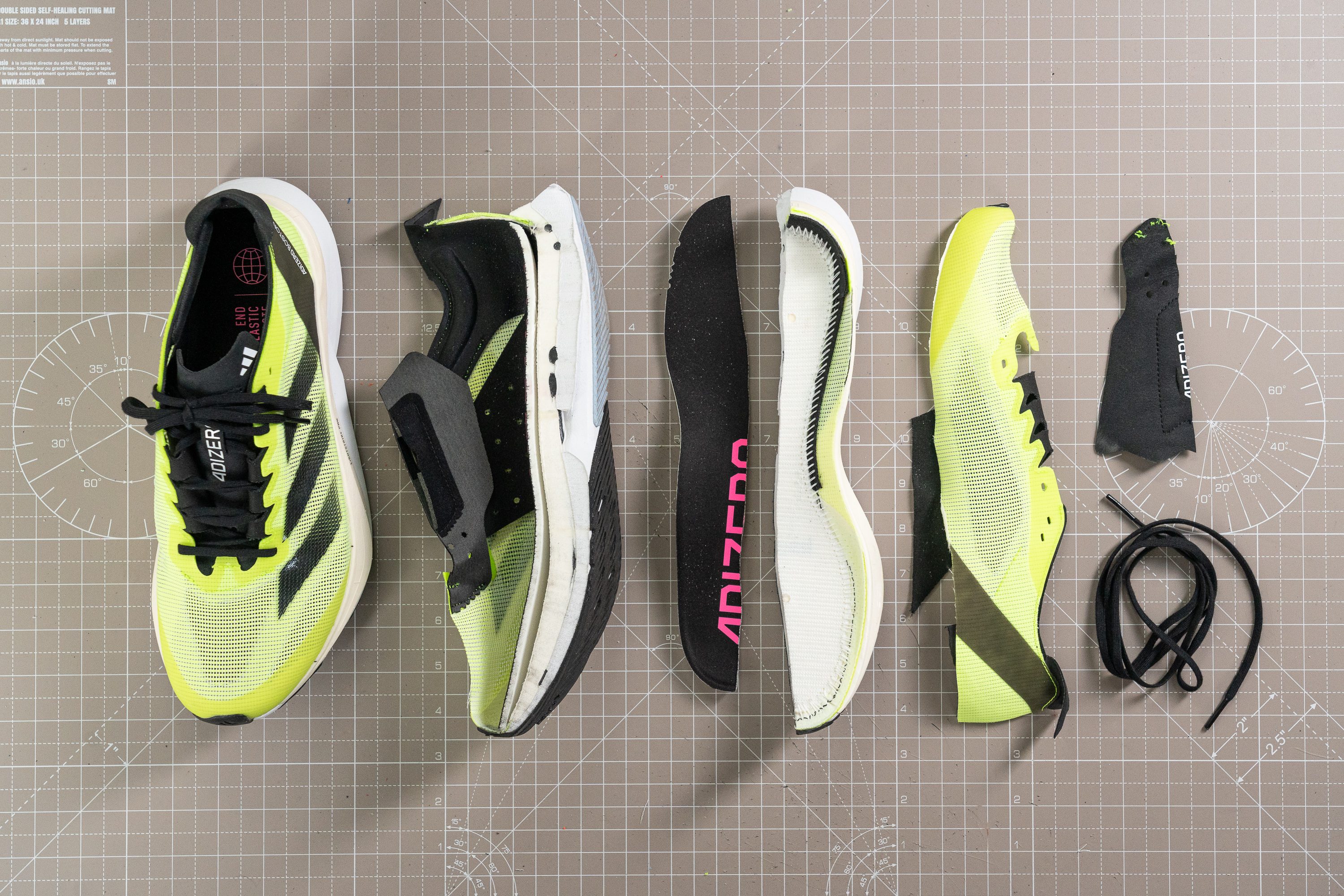
| Adizero Boston 12 | Yes |
Midsole softness in cold (%)
EVA midsoles tend to get really firm in cold temperatures, and the Lightstrike 2.0 foam follows this pattern. We measured it at 30.0 HA after a 20-minute nap in our freezer, and we also felt it firmer underfoot.
This 25% firmness increase is a standard result, yet it signifies an upgrade from the first-generation Lightstrike foam.
| Adizero Boston 12 | 25% |
| Average | 24% |
Reflective elements
Once again, Adidas seems to have overlooked the needs of night runners. The shoe doesn't have a single reflective element, which is a disappointment.
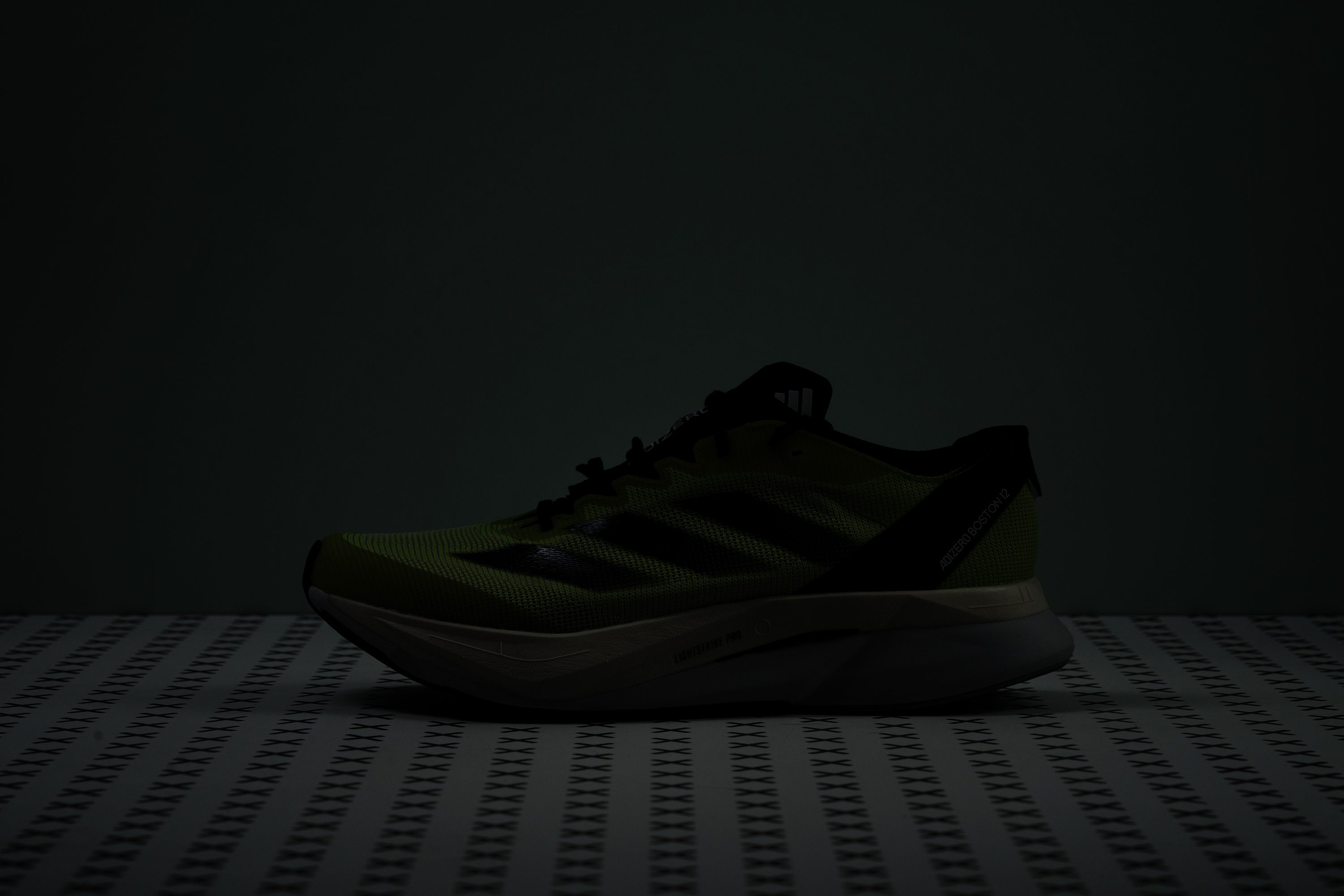
| Adizero Boston 12 | No |
Tongue padding
Adidas has really taken a weight-loss approach with the Boston 12, and it seems like the shoe's tongue got a bit too much of the slimming treatment. Now it's half the usual thickness in a training shoe.
We're not big fans of this particular change—the tongue really feels one of the few steps back from the previous models.
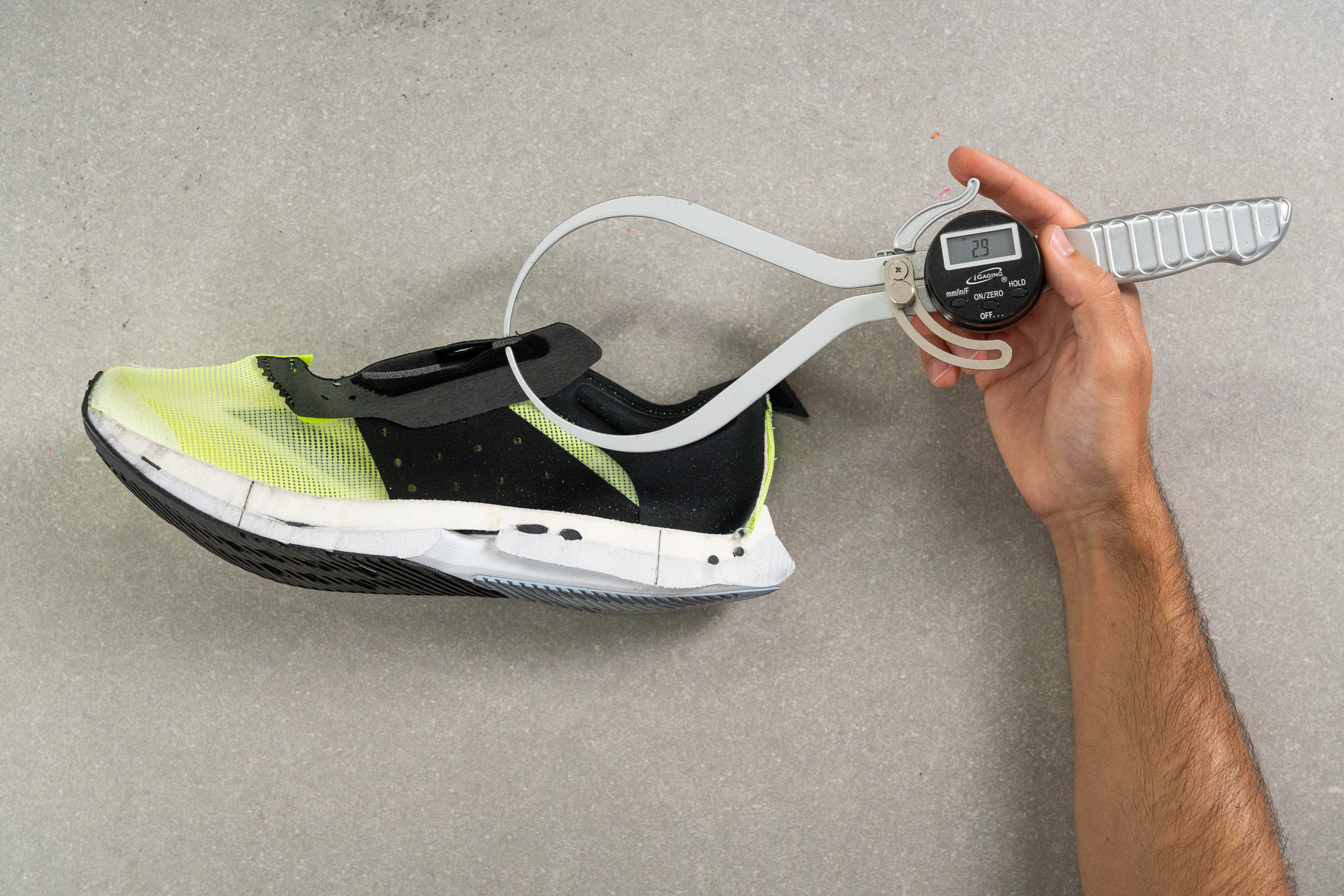
| Adizero Boston 12 | 2.9 mm |
| Average | 5.7 mm |
Tongue: gusset type
In our lab test of the Boston 11, we liked its fully-gusseted tongue, though if we were designing the shoe, we'd have opted for a semi-gusseted design.
Now, Adidas has dismissed the fully-gusseted tongue, which might sound like good news. But they've replaced it with a non-gusseted one. That's a real bummer, especially for a training shoe that sets you back £160.
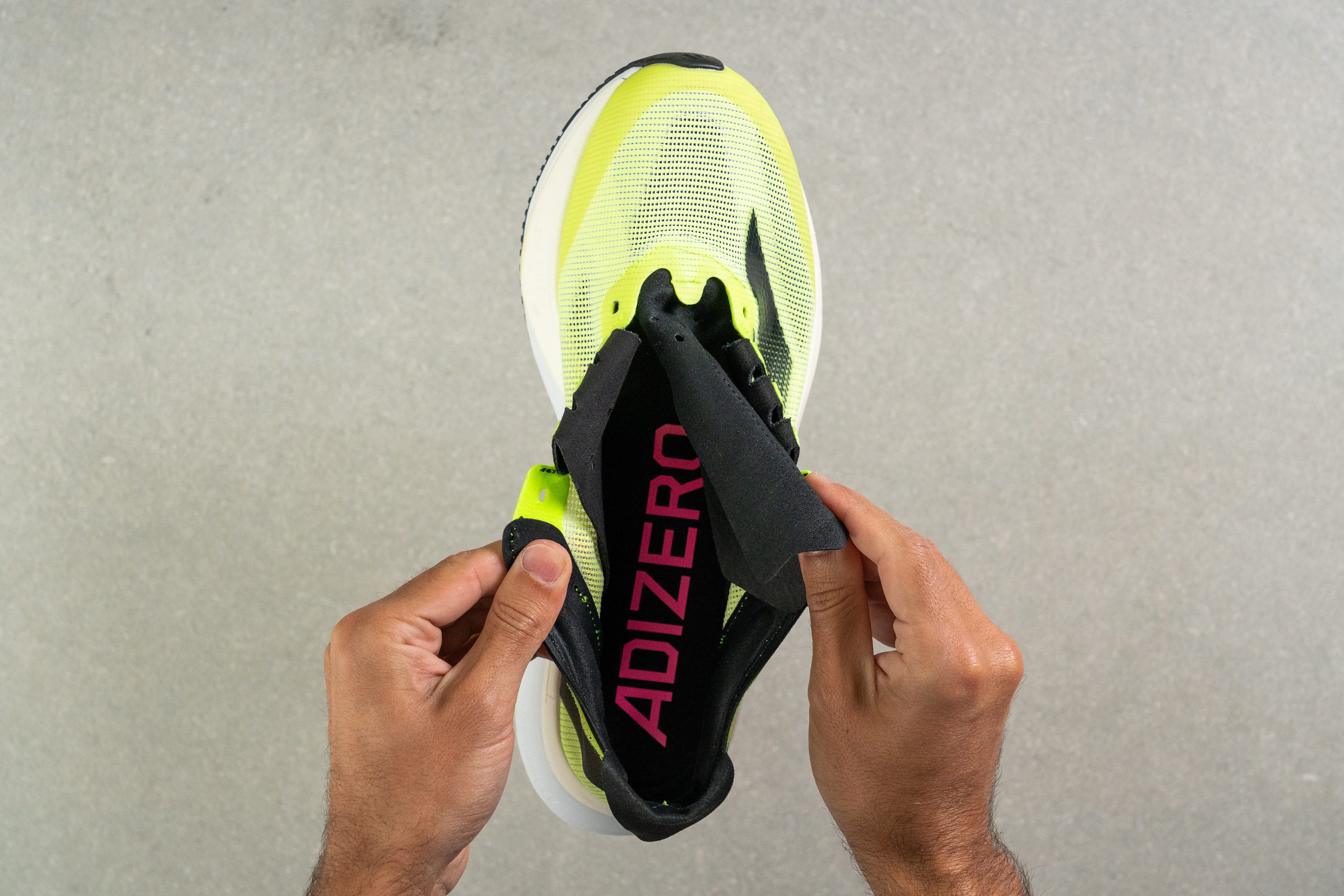
| Adizero Boston 12 | None |
Heel tab
Keeping up with Adidas' cool design trends that started with the Adizero Adios Pro 3, the Boston 12 sports the same slick, flap-like pull tab on the heel.
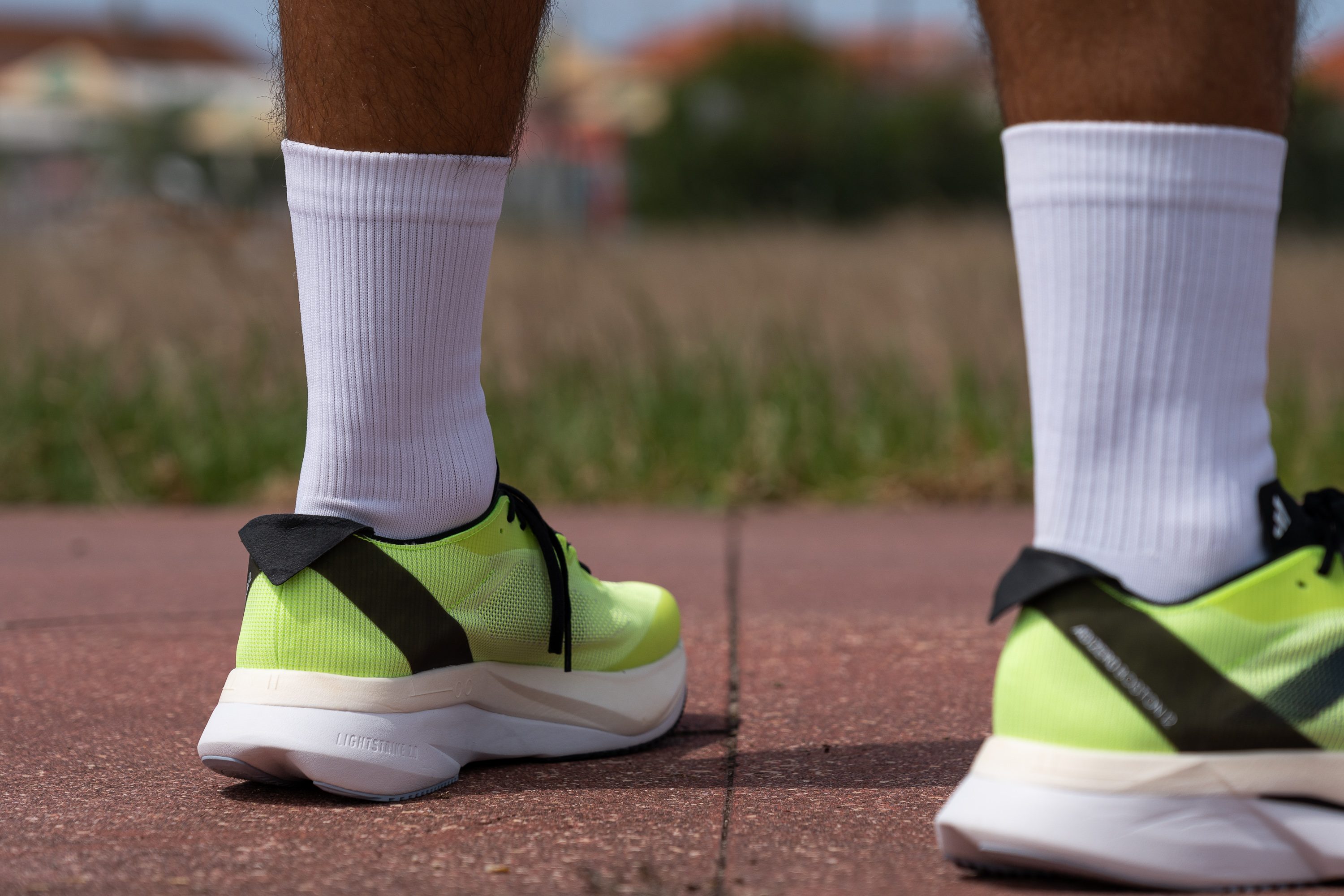
We've got to say, we're totally digging this look—it's like having the rear wing of an F1 car right on our heels!
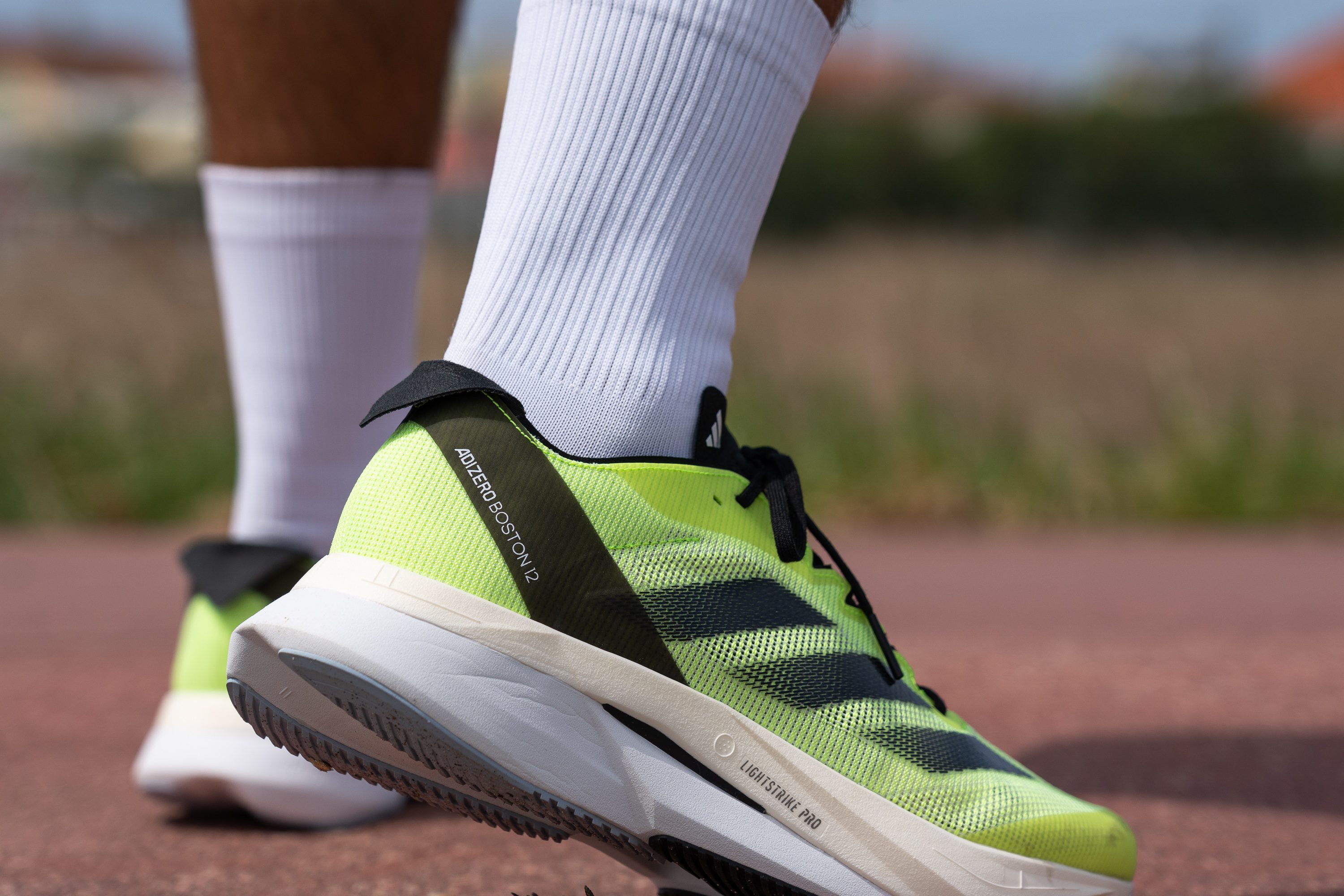
| Adizero Boston 12 | Pull tab |

